MARCH 2025

NZ SQUASH OPEN 2025
ACTION FROM DAY 1
PEAK PERFORMANCE WITH KEMP - THE HIGH PERFORMANCE MINDSET
MYSQUASH COMPETITIONS HOW TO GET STARTED

MARCH 2025

NZ SQUASH OPEN 2025
ACTION FROM DAY 1
PEAK PERFORMANCE WITH KEMP - THE HIGH PERFORMANCE MINDSET
MYSQUASH COMPETITIONS HOW TO GET STARTED

Independent research by leading consumer magazine Reader’s Digest found G.J. Gardner Homes to be New Zealand’s Most Trusted Home Builder once again.
Talk to us today and see why more New Zealanders trust G.J. Gardner to build their homes year after year.
0800 42 45 46 / gjgardner.co.nz
6. Letters to the office
8. PSA Squash Tour - Paul Coll wins Motor City Open
9. Player Profile Anabel Romero Gemmell
10. Youth Sports Exchange with Hong Kong
12. Peak Performance with Kemp - The HP Mindset
14. NZ Squash Open 2025 - Action from Day 1
16. Player Magazine Extract
20. Cardiac Arrest Drama in Whangarei
21. Club of the month - Pirates Squash Club
22. Club Showcase - Ohakune Membership Drive
24. Club Uplift
26. Tournament Controller Pathway
28. Guest writer - Rod Hayes
30. Coach Mentor Profile - Mike Allred
31. Coaching Tip - Practice Matches to Improve Your Game
36. MySquash Competitions - how to get started Stay updated with our other channels




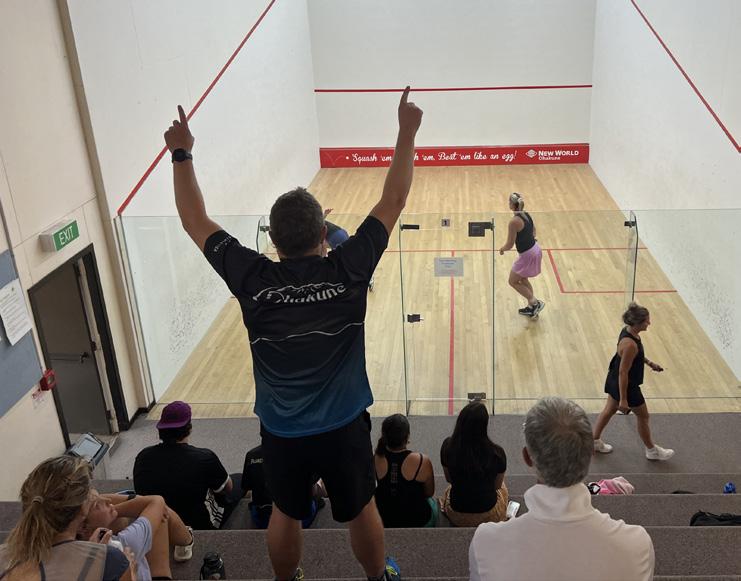
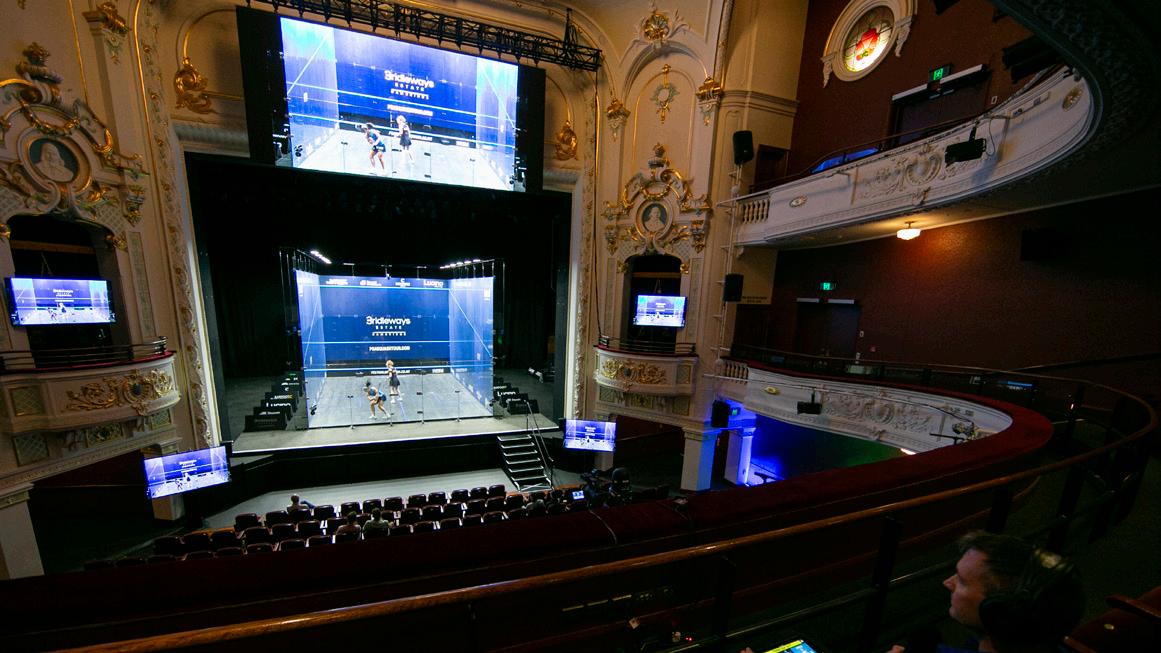
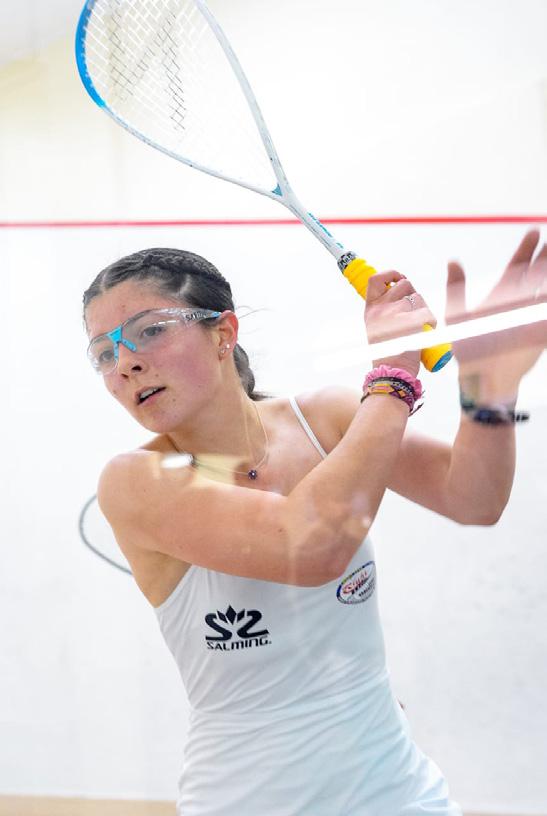


Tēnā koutou

I’m writing from Christchurch, where we are making history with the 21st New Zealand Squash Open—the first ever to be held in the South Island. This tournament is particularly special as it brings the event to the home region of local hero Paul Coll, who hails from Greymouth and attended school in Christchurch.
With 48 players from 17 different countries, this year’s Open once again highlights the truly global nature of squash. A huge thank you to the local organising committeean incredible team of hardworking individuals, the majority of whom are volunteers dedicating 12 to 16-hour days to ensure the event runs seamlessly. Their passion and commitment are the backbone of this tournament.
Now, as the competition unfolds, we have the privilege of witnessing world class squash, drawing inspiration from the thrilling battles ahead as we await the crowning of our new champions. Be sure to catch the action live on Sky Sport or PSA Squash TV.
Meanwhile, kicking off on Friday is the New Zealand Junior Open, a fantastic showcase of the country’s top young talent competing alongside some of the world’s best. Don’t miss the livestream, and take note—the semi-finals and final will be played on the grand stage at the Isaac Theatre Royal, an unforgettable experience for our rising stars.
Enjoy the action!
Ngā mihi Martin Dowson
Event
New Zealand Junior Open
New Zealand Open
Waikato Open
Auckland Masters
New Zealand Doubles Championship
Central Masters
Oceania Junior Championships
Date
7th – 9th March
4th - 9th March 14th - 16th March
20th - 22nd March 28th-29th March
11-12 April
19-21st April
Christchurch Squash Club
Isaac Theatre Royal / Christchurch
Hamilton Squash & Tennis Club
Kumeu Squash Club
Hutt City Squash Club
Okato Squash Club
Hamilton Squash & Tennis Club
Don’t miss any upcoming events. Click HERE to access the full tournament calendar
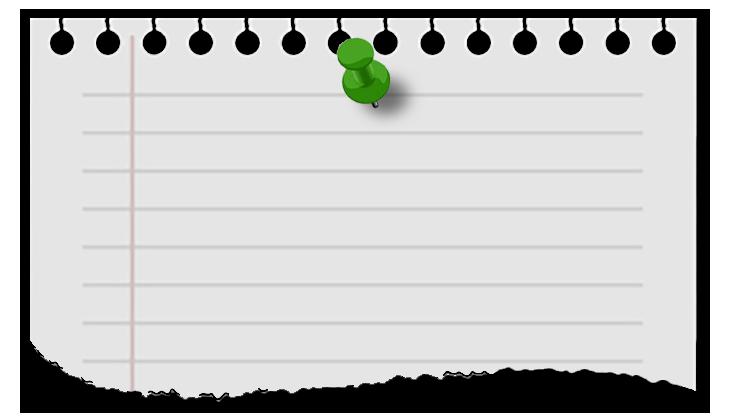
WHY SQUASH PLAYERS ARE SOME OF THE MOST IMPRESSIVE ATHLETES, as told by Olivia Waver to Olympics.com
USA squash star Olivia Weaver tells Olympics.com about the key attributes an elite squash player must have... and some of them might surprise you.
See the clip HERE


An interesting article was published by Inside The Games regarding squash’s inclusion in the LA28 Olympic Games. The following story highlights key insights from World Squash Federation President Zena Wooldridge, outlining the significance of this milestone and what it means for the future of our sport
Read the full article HERE

Question
The requirement for clubs to “bring their courts up to standard” seems like a major push. I understand that having high-quality courts nationwide would be ideal, but how are clubs expected to afford these “required” upgrades when fees, insurance, and general maintenance costs are rising rapidly? Wouldn’t it be more beneficial for SquashNZ to invest more time in supporting clubs to attract new and younger players, which would naturally help increase membership?
Cindy Marsh
Answer
Thank you for your question. Our surveys indicate that many clubs are not meeting members’ expectations when it comes to warm, clean facilities and the overall quality of their courts. Additionally, 70% of our squash facilities are over 40 years old, and 62% have been self-rated as below “good” quality.
To future-proof our sport and ensure we retain and grow membership, it’s essential for clubs to invest in maintaining—and ideally upgrading—their facilities. We recognise the financial challenges this presents, which is why Squash NZ continues to introduce initiatives aimed at helping clubs grow their membership base. This year, our primary focus is on increasing junior participation, which we believe will contribute to long-term sustainability for clubs.
We appreciate your feedback and encourage clubs to engage with us for guidance on membership growth and facility development.
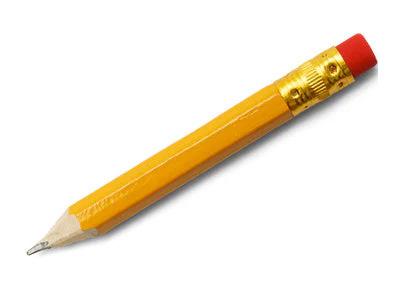
Question
I’m trying to register for a tournament but don’t understand how to do it. I can get into my profile in MySquash. Can you please help?
Thanks Beau
Answer
Hi Beau
Log in to MySquash, click on Competitions in the menu and click on the MySquash Competitions tile.
Click on “Competition Actions” / Individual Competitions. This takes you to all the tournaments you can enter, and you can filter them at the top by district and club.
Click on the tournament you want to enter and fill in your details and click the “Register for Tournament” button. You’ll then see a yellow rectangle at the bottom right of the tournament in your Individual Competitions. This tells you you have registered for that tournament.
You can also view a video guide on how to enter tournaments HERE.
If you are unable to see any tournaments in the Competition Actions / Individual Competitions page, please contact your club to check you have been given the correct MySquash player subscription access.
Hope that helps
We welcome letters to the national office. Please send your letter to admin@squashnz.co.nz
We will publish a selection each month, all questions will receive a response if not published.
Orders closes 11th March
Delivery early May at latest
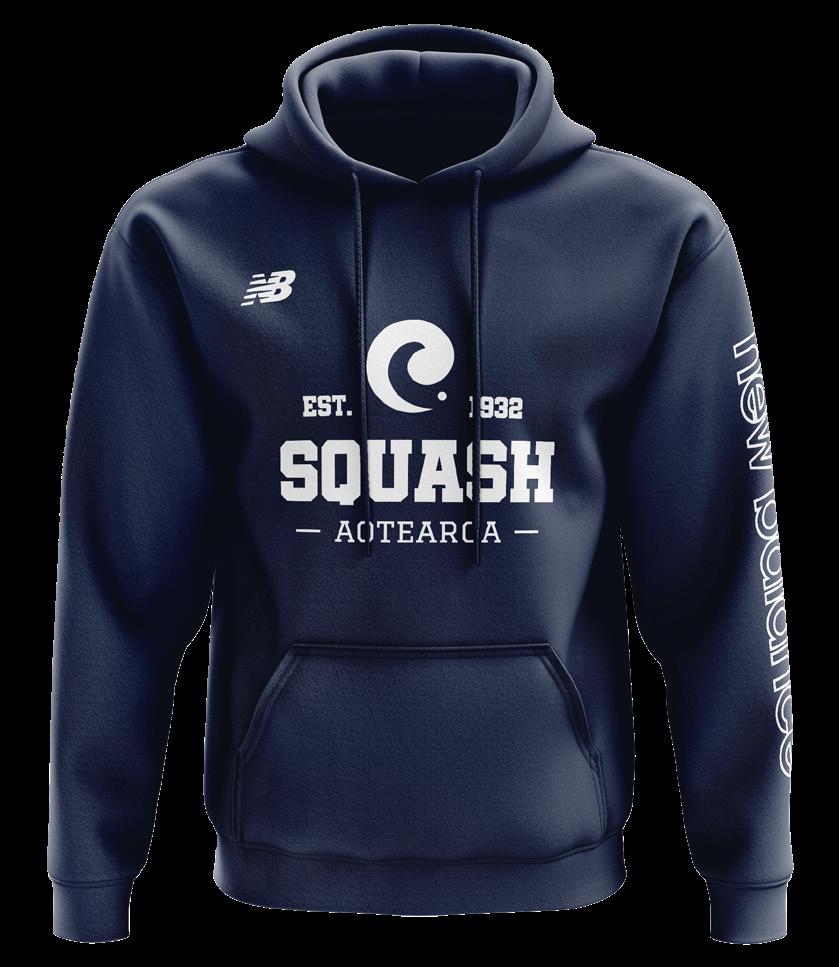

Orders closes 11th March
Delivery early May at latest
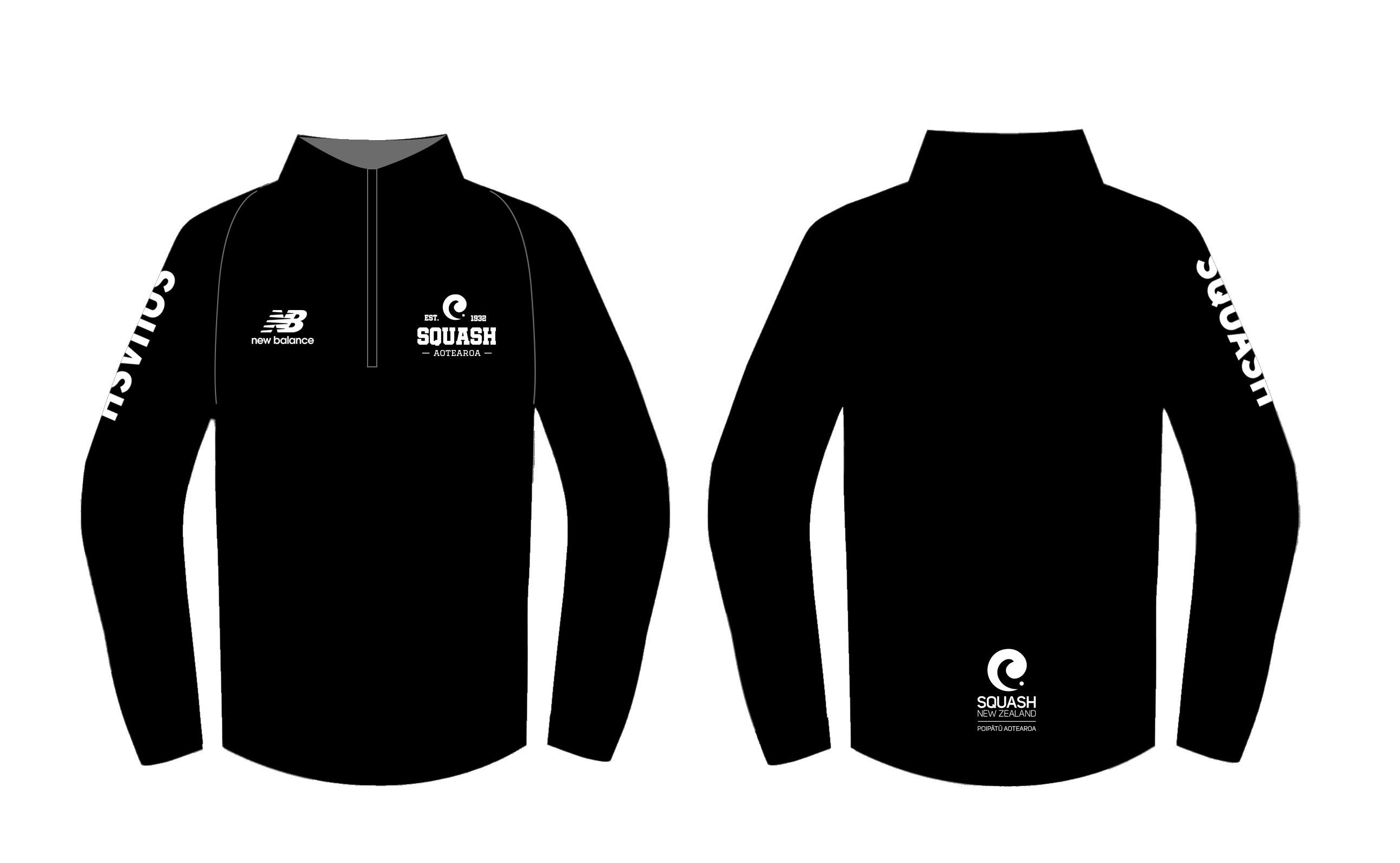

New Zealand’s Paul Coll has captured his first title of the 2024/25 PSA Squash Tour season, defeating Mexico’s Leonel Cardenas in a marathon 91-minute encounter at the Motor City Open 2025 in Detroit.
No.2 seed Coll, a strong favourite in the Silver-level event after the withdrawal of four-time champion Diego Elias, was pushed all the way throughout a brutal final at the Birmingham Athletic Club, eventually taking the match by an 8-11, 12-10, 11-9, 11-9 scoreline.
The four-game win was a demonstration of Coll’s relentless hitting, physical power and mental steeliness, having had to fight back from 1-0 down, and then from game ball down in the second, on his way to capturing the title.
The match began with both players happy to play long rallies while retaining the high tempo of the match. It was Cardenas, though, who managed to get himself an early lead on the scoreboard, never letting Coll retake the lead throughout the 26-minute first game before sealing it with a sublime overhead volley into the nick. Coll came out of the traps quickly in the second, looking to press on the short line and hunt down the volley on both sides. However, Cardenas proved tough to break down, coming from behind to hold a game ball on his racket at 10-9 up. The West Coaster then pulled off a string of incredible retrievals to force a tie-break before levelling the match after almost 50 minutes of squash.

The fourth then went down to the wire, with the players deadlocked at 9-9 before Coll found his best squash at this pivotal moment. The 32-year-old managed to squeeze out Cardenas down the backhand wing on his first championship ball, letting out a huge roar towards his team as he picked up his first PSA title since April 2024.
“It’s been a pretty tough week for me all week. I haven’t been on my top form, but I’m very proud of how I got through it mentally. To get the title here today in my third final here at the Motor City Open, I’m extremely proud, said Coll.
“Leonel was impressive. I thought he was getting very tired, but he never gave me any cheap errors. I had to hit winners to win it. Credit to him because he was playing very well and very tough. It was nice to see him playing like that. He made it very tough today, a bit tougher than I would have liked, but it was a good battle.
“I’m starting to feel a bit better on court. This week was good for working a few things out and getting through a few tough matches mentally. I managed to find some good form at the back end. I’m excited to hit home to my hometown and play some good squash.”
The two players continued to go toe-to-toe in a wellmatched third game, but two consecutive strokes from Cardenas at 7-7 opened the door for Coll. The No.2 seed held his nerve to move 2-1 up and within a game of the title.
Coll will be in action at the New Zealand Squash Open in Christchurch in early May.
Result:
[2] Paul Coll (NZL) bt [7] Leonel Cardenas (MEX) 3-1: 8-11, 12-10, 11-9, 11-9 (91m)
What’s your why? Why do you play squash?
I play squash because it has opened up incredible opportunities for me—whether it’s forming new friendships, experiencing exciting adventures, or pushing myself to grow. Beyond just being a sport, squash has taught me valuable life lessons like discipline, resilience, and mental toughness. It also helps me stay active and maintain my overall health, making it an essential part of my life.
What has been the most memorable moment in your squash career so far?
I have so many memorable moments in my squash career that it’s hard to choose just one! However, the most unforgettable experiences have come from the three World Junior Championships I’ve been fortunate enough to attend. Competing on the world stage, representing NZ, and sharing those moments with incredible teammates and competitors have been truly special.
How do you stay motivated during tough training or competitions?
I stay motivated by focusing on my long-term goals and breaking tough challenges into smaller, manageable steps. I remind myself why I started playing and try to keep a positive mindset to push through tough moments.
Who has had the biggest influence on your career, and how?
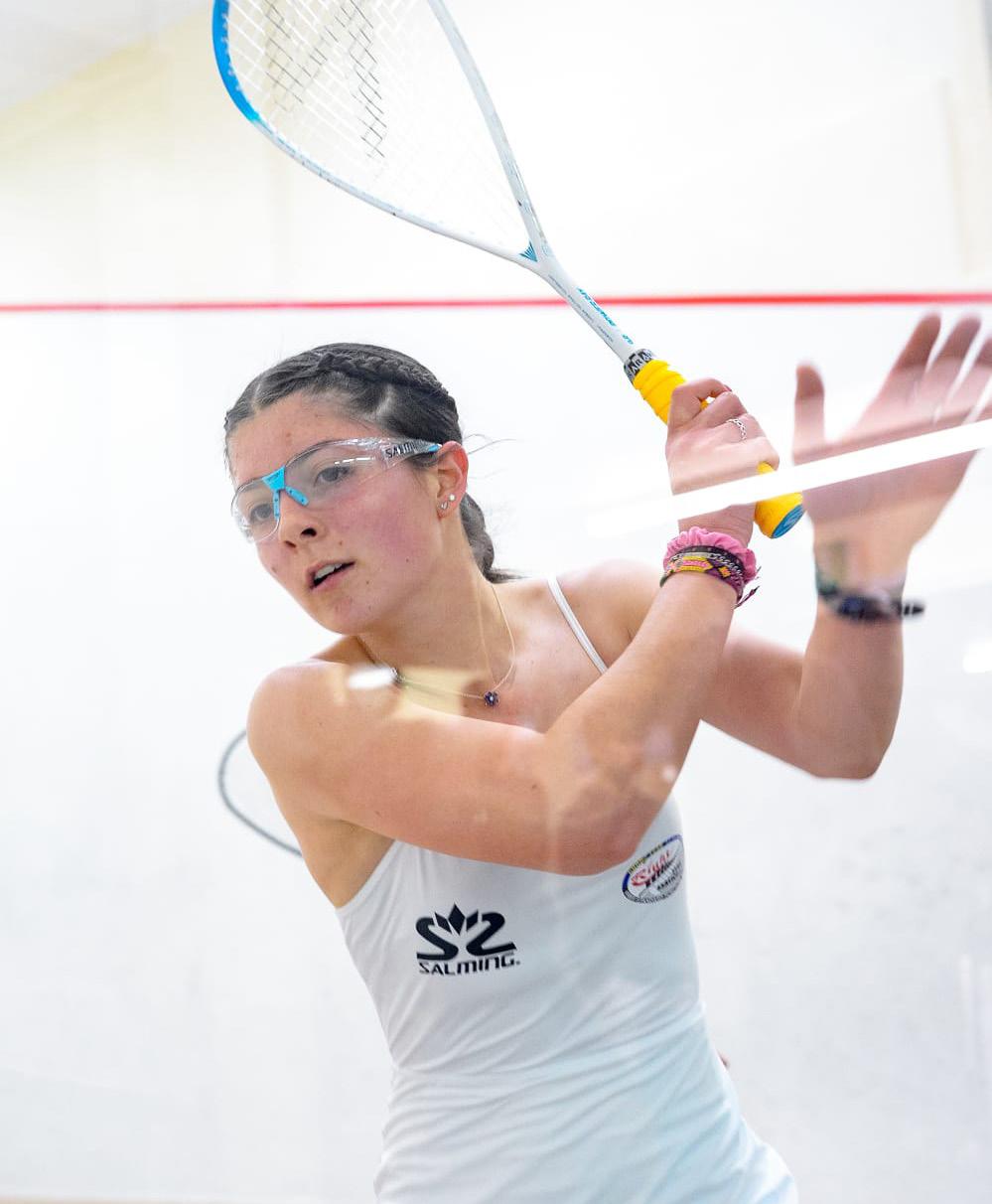
What’s one thing you’ve learned through playing squash that you apply to other areas of your life?
Being able to perform under pressure is an important skill I’ve gained from squash, and it’s something I’ve applied to other areas of my life as well.
It’s tough to pinpoint just one person, as I’ve been fortunate to have many influences throughout my squash career. However, my biggest influences to date are my parents, my coaches—Grant and Kashif—and my idols, Kaitlyn and Joelle. Each of them has played a significant role in shaping my journey, whether through support, guidance, or inspiration.
What do you think is the most important quality for success in squash?
I believe the most important quality for success in squash is mental toughness.
When you’re not on the court, what do you enjoy doing in your free time?
I love to draw, read, and participate in other sports.
If you could change one thing about the sport of squash, what would it be?
The tin to be lowered for all matches not just the PSA!
What’s your ultimate goal in squash, and how do you plan to achieve it?
My ultimate goal in squash right now is to compete at the Olympics one day. I believe it’s a dream that many squash players share now. I plan to achieve this by being disciplined in my training and setting high goals for myself
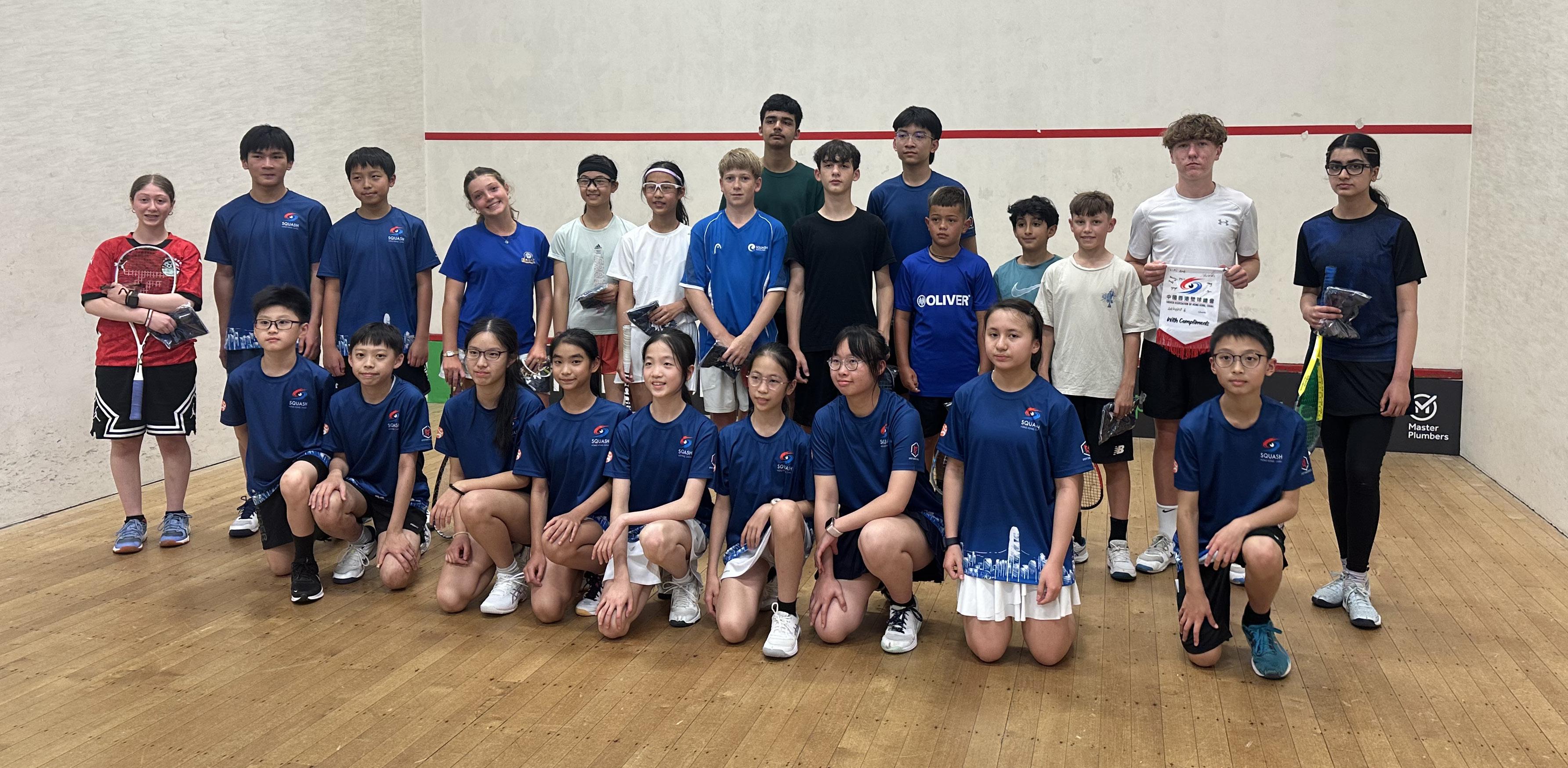
The recent Youth Sports Exchange Programme brought Hong Kong’s talented junior squash players to New Zealand, providing a fantastic opportunity for both teams to develop their skills and experience the sport from an international perspective— without having to travel overseas.
The programme kicked off in Auckland at the North Shore Squash Club, where the Hong Kong players trained under coach Paul Hornsby and faced off against local juniors in a friendly test match. From there, the group travelled to Hamilton to work with performance coach Emma Millar and then onto the Devoy Squash Centre where they trained with Jonathan Kemp and John Cornforth. The players enjoyed intense training sessions and more friendly competition, this time with some of the top juniors from the Waikato/ BOP regions.
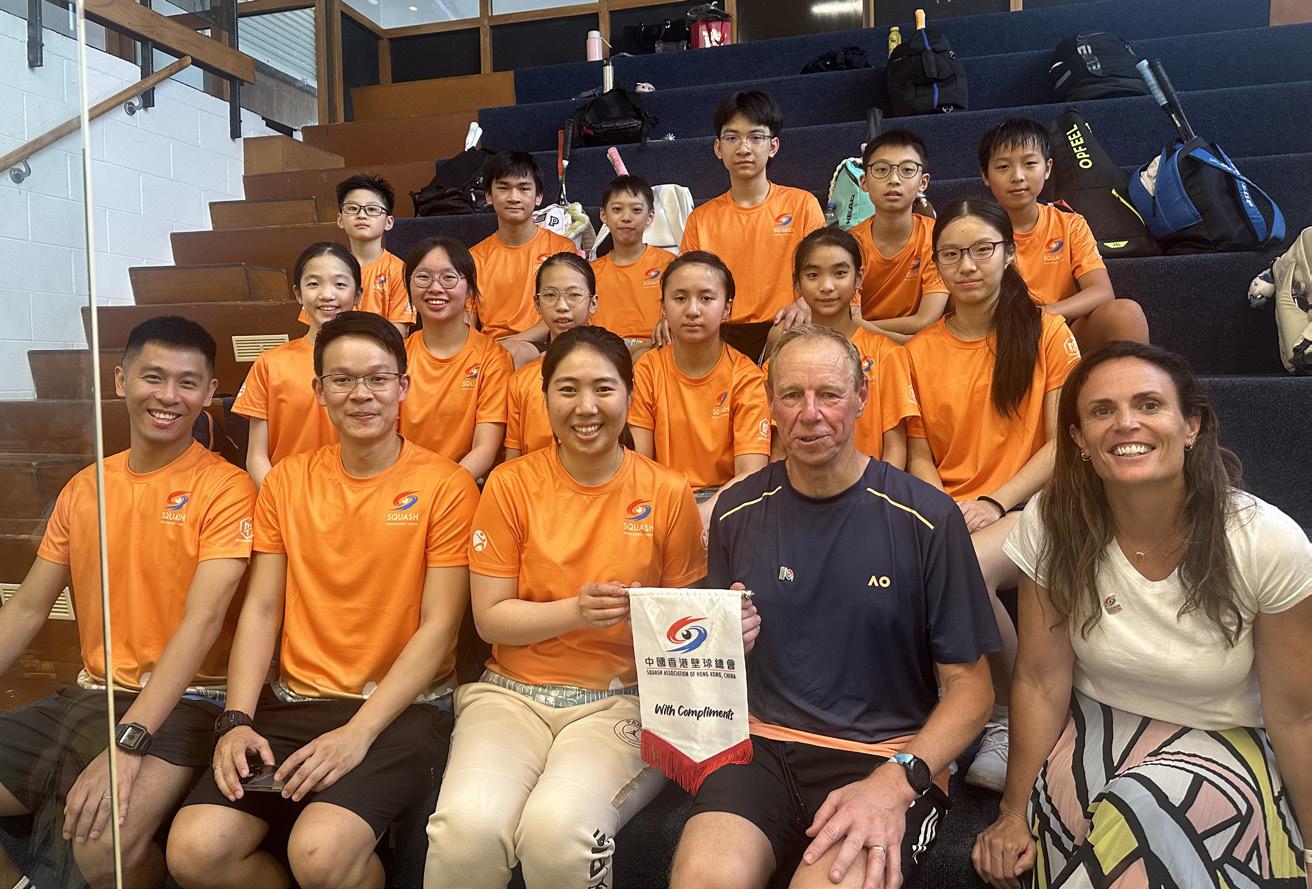
helping to foster stronger relationships and mutual respect between the two teams.
The exchange was a great success, with both the Hong Kong and New Zealand players gaining valuable insights from each other. Coaches also benefited from the experience, sharing knowledge and learning from different coaching styles. The programme highlighted how international exposure doesn’t always require leaving the country.
Throughout the trip, the athletes not only improved their squash skills but also had the chance to experience New Zealand’s culture and landscapes. Visits to iconic locations like the Auckland Sky Tower and Rotorua added a memorable cultural element to the exchange,
Moving forward, Squash New Zealand hopes to continue offering these valuable exchange opportunities, further developing our players and building stronger ties with the global squash community.
The 2025 Trans-Tasman Test Series is just around the corner, and the team has been selected
After an intense and closely contested selection process, we are pleased to announce the 16 players who will represent New Zealand in this exciting international competition, taking place in Hamilton (April 22-23) immediately following the Oceania Junior Championships (April 19-21).
The selection for this year’s Trans-Tasman team was based on performances at key events, including the 2024 NZ Junior Age Group Championships (October), the 4-day National Development Camp held in January, and the Henderson PSA event (Feb 14-16). After assessing players’ mental readiness, fitness, selection event performances, and overall progression, the top two Under 15 players, top two Under 17 players, and top four Under 19 players (boys and girls) have earned their spot on the team.
The competition was fierce, and the selection process was incredibly close, reflecting the depth of talent we have in New Zealand. The final team will be coached by Jonathan Kemp, Evan Williams, and Emma Millar, with High Performance Manager Catherine Logan-McLeod acting as the team manager.
One of the most exciting aspects of this year’s TransTasman series is that immediately after the competition, the players will transition into a National Development
U15 Boys
Eamon Gannon
Levi Casey
R. Samuel Rouse
U17 Boys
Brodie Bennett
Maximus Mathews
R. Zac Laing
U19 Boys
Oliver Dunbar
Vihan Chathury
Riley Noonan
Riley McCracken
R. Jack Frisken
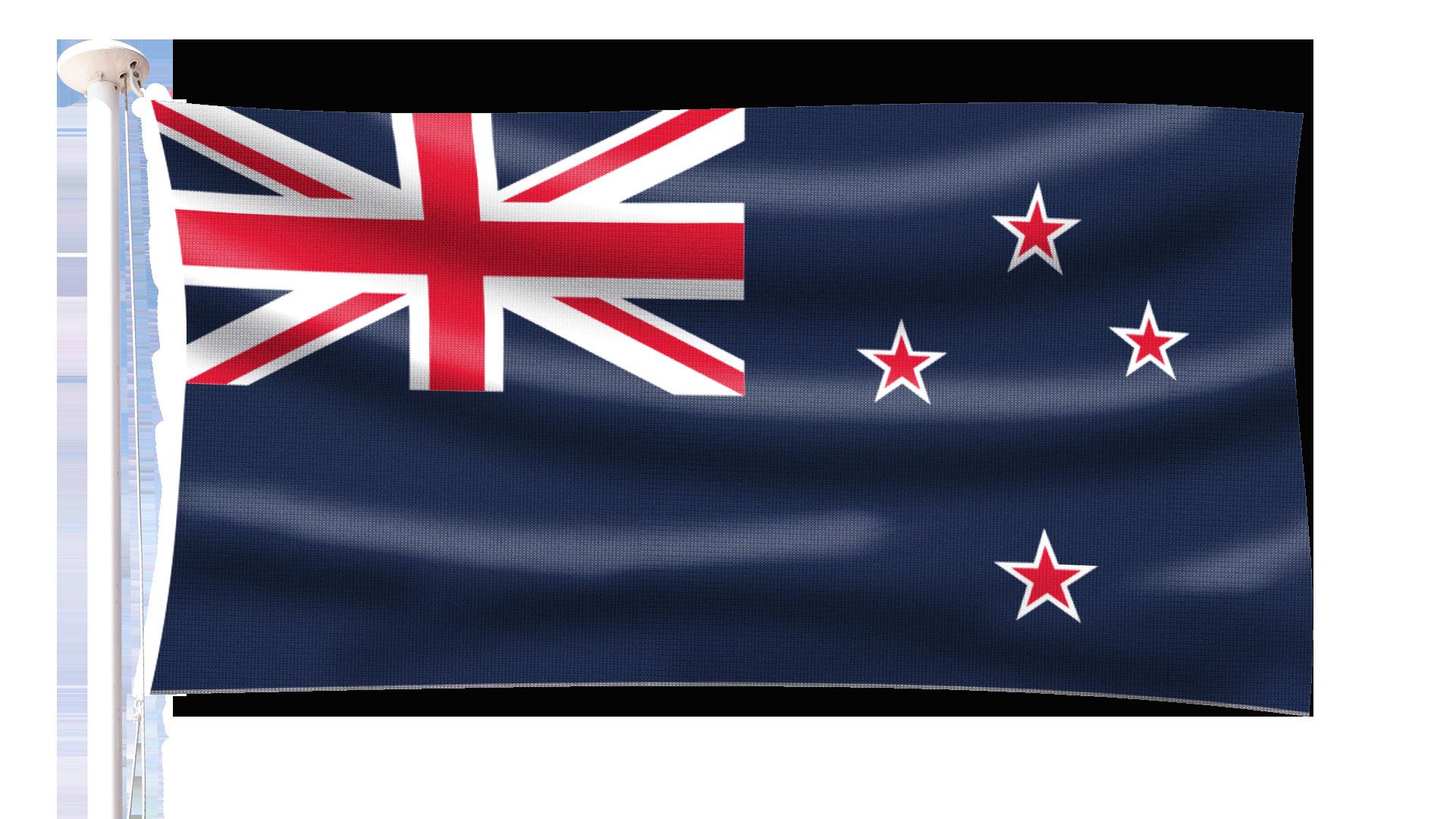
Camp. During this camp, they will participate in challenge matches against each other for World Junior Team selection, which will take place in Cairo, Egypt, this July. This is the first time our calendar has been designed this way, with the aim of testing both the physical and mental toughness of our players.
The idea behind this unique setup is to replicate the high-pressure environment of the Junior World Championships. By pushing players to perform while they’re physically and mentally fatigued, we can better assess their readiness and resilience. This is essential for preparing them for the intense expectations they will face when they compete on the world stage in Egypt.
So far, our development players have truly thrived under this new approach, consistently rising to the challenges they’ve faced. It’s clear that there is a shift happening in the high-performance culture, and we couldn’t be more proud of the progress our young players have made. We’re all excited to see how they continue to grow and to witness their performances at the Trans-Tasman Test Series and beyond.
Stay tuned for more updates as our players continue to make us proud, and we look forward to seeing what they are capable of in the upcoming competition!
Liberty Jones
Yusra Rashid
R. Animaia Payne
U17 Girls
Brooke Valois
Casey Ellery
R. Amalia Ricketts
U19 Girls
Anabel Romero Gemmell
Ella Hill
Maiden Lee Coe
Aria Bannister
R. Erin Wylie
Elite squash players don’t just train hard—they train smart. Every movement, shot, and decision on the court must be executed with precision. Developing a high-performance mindset means breaking down your game and identifying even the smallest areas for improvement and then selecting the ones that will provide you with the best gains to focus on. Are your footwork patterns as efficient as they could be? Is your technique simple and consistent? Are you positioning yourself optimally for every shot? These details, often overlooked by casual players, are what separate the best from the rest.
True progress in squash isn’t made overnight. It’s the result of thousands of hours of disciplined, focused practice. Improvement isn’t linear—it gets harder and harder as you reach higher levels. The gains that once came easily as a junior, require significantly more effort to sustain and refine. This is where discipline plays a critical role. Sticking to your training plan, improving fitness, and working on weaknesses—especially when it’s tough—are the hallmarks of a champion. The best players push through fatigue, setbacks, and plateaus, knowing that breakthroughs come from consistent effort over time.
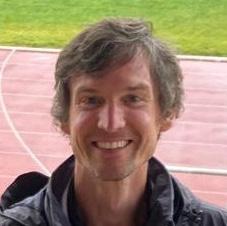

experimenting with different strategies, and refining techniques. No matter how skilled you are, there’s always something to improve. The best players stay curious, open-minded, and adaptable, always searching for better ways to play, train, and think about the game.
A high-performance mindset means embracing the idea that there is always more to learn. The top players in the world are relentless in their pursuit of new knowledge— analysing matches, seeking coaching insights,
One of the biggest mental barriers in high-performance squash is understanding that improvement never gets easier—it only gets harder. As you advance, the margins for growth become smaller, and the effort required to make even slight gains increases. The difference between good and great often comes down to a willingness to do the extra work, push through discomfort, and commit to refining every aspect of your game, both physically and mentally.
The difference between good and great often comes down to a willingness to do the extra work
A high-performance mindset in squash is built on attention to detail, unwavering discipline, and a growthoriented approach. Success is not about shortcuts or easy wins—it’s about the willingness to put in the work, day after day, even when progress feels slow. By committing to this mindset, you give yourself the best chance to reach your full potential on the court.
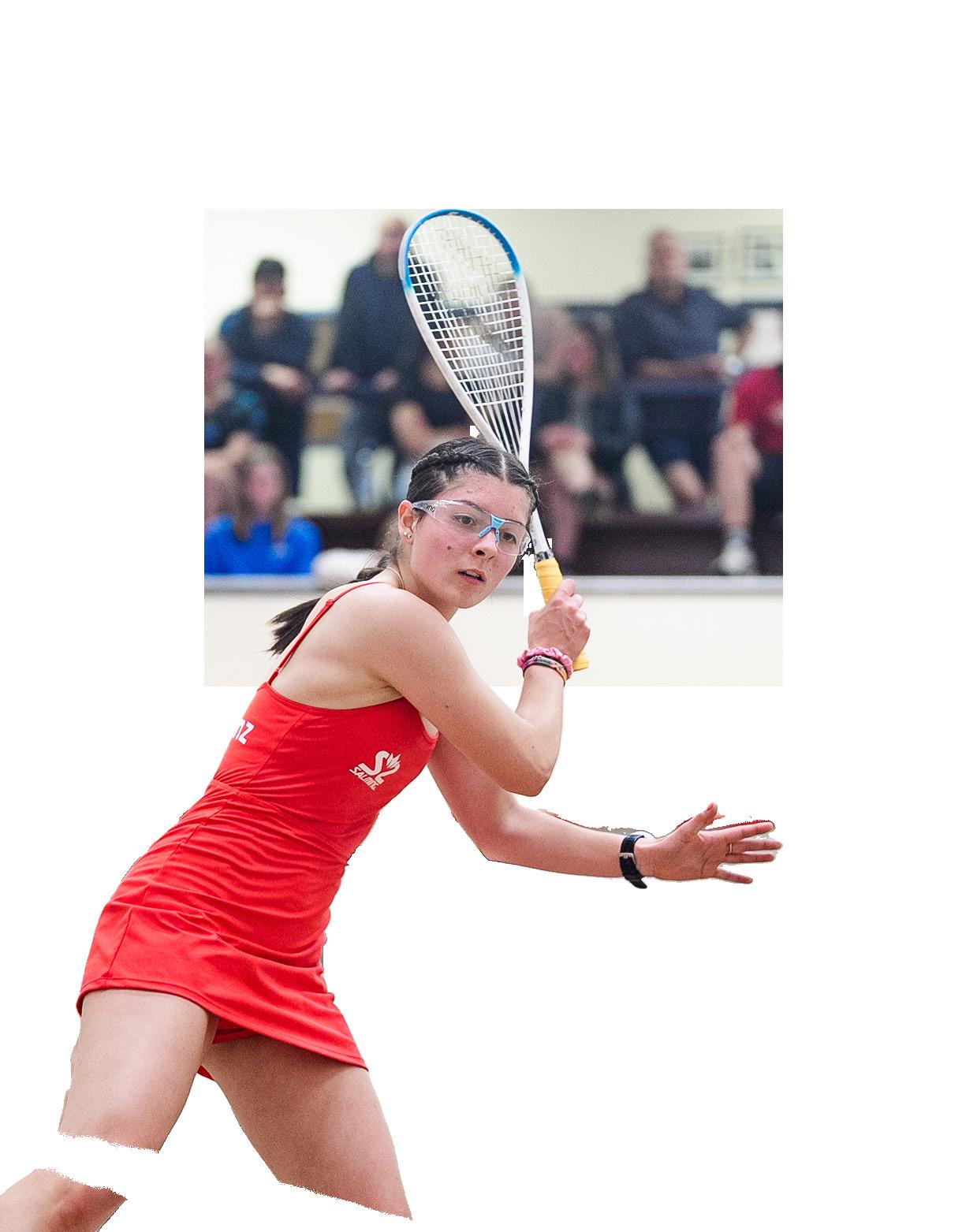
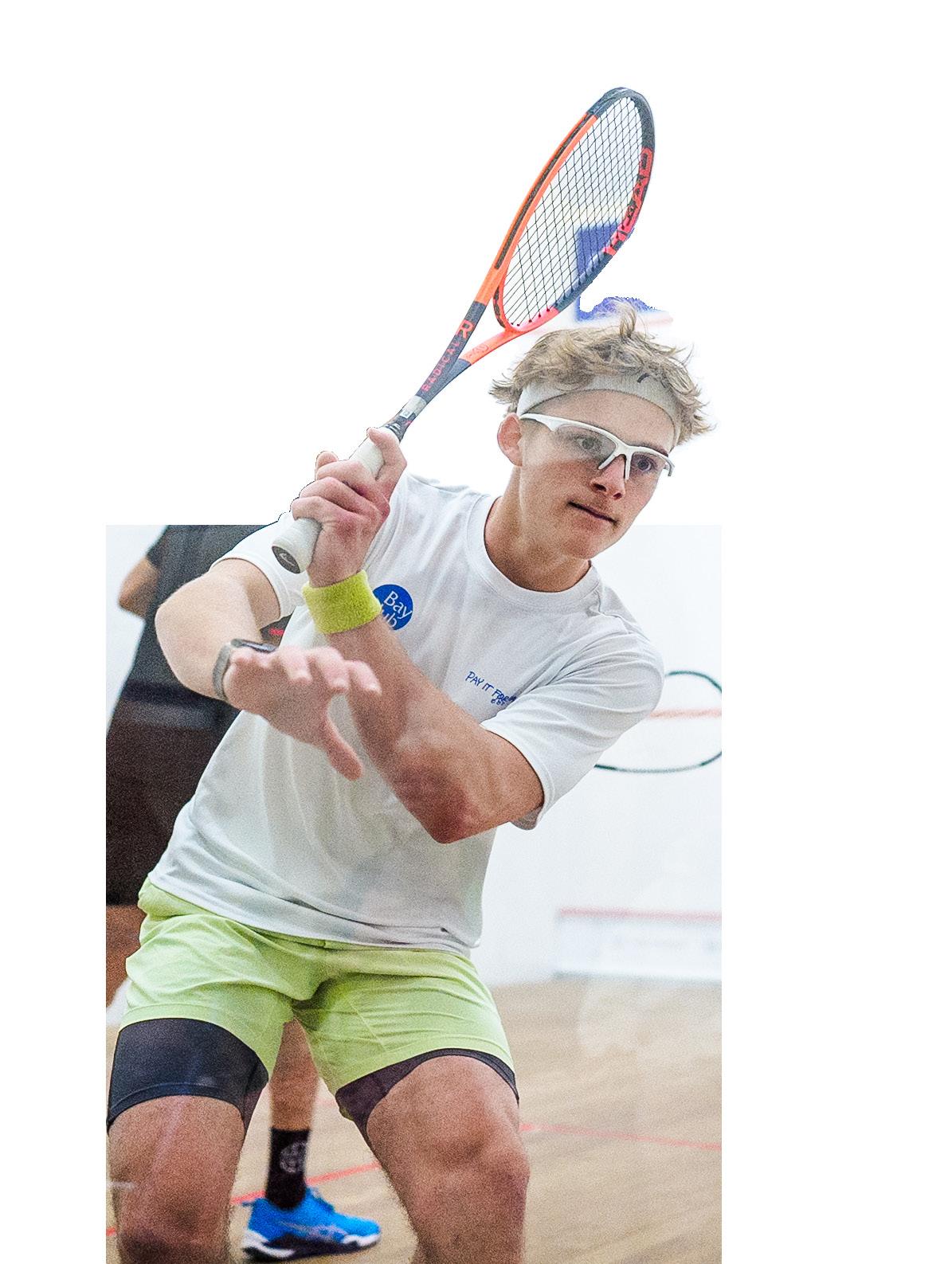



ACTION FROM DAY 1

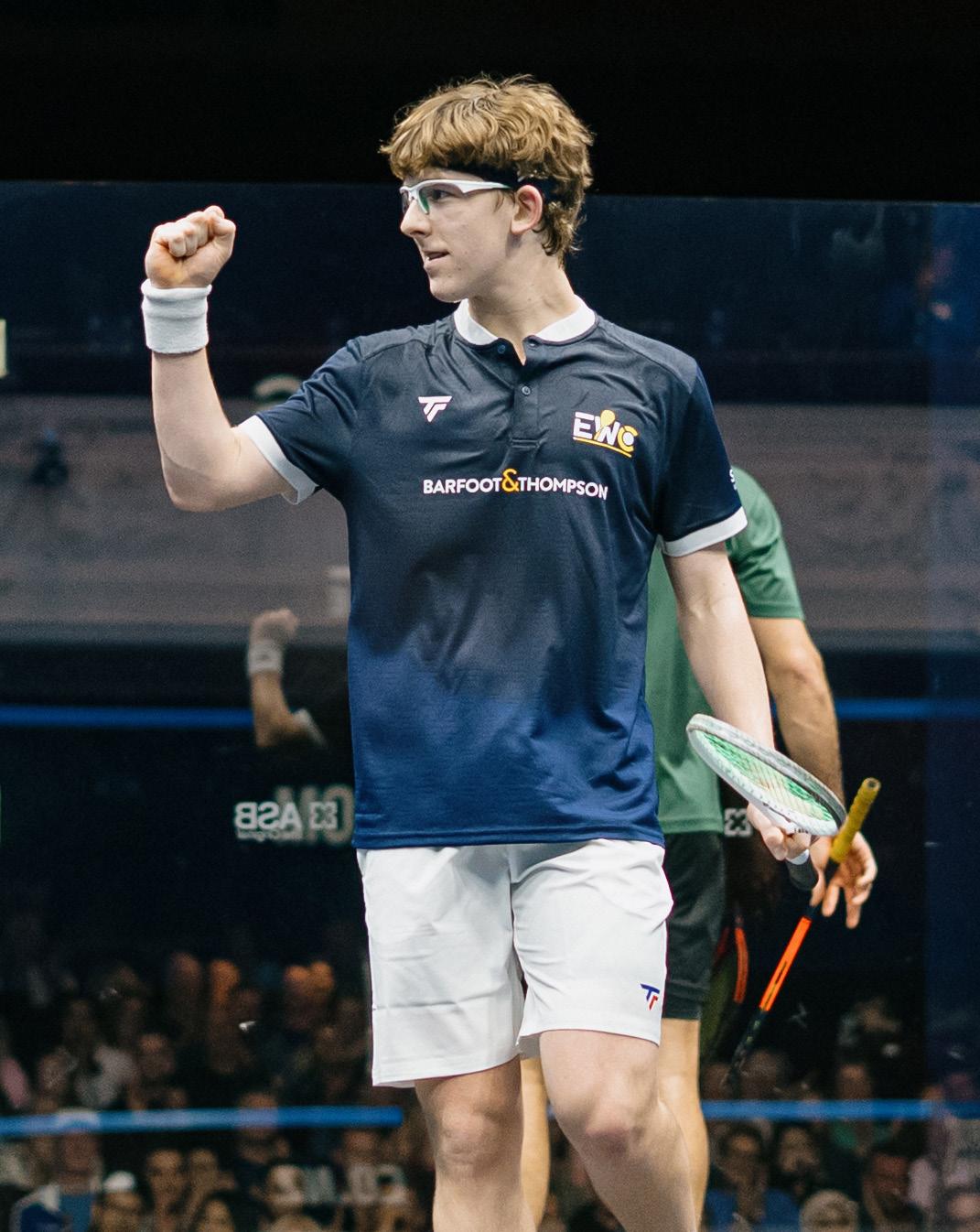
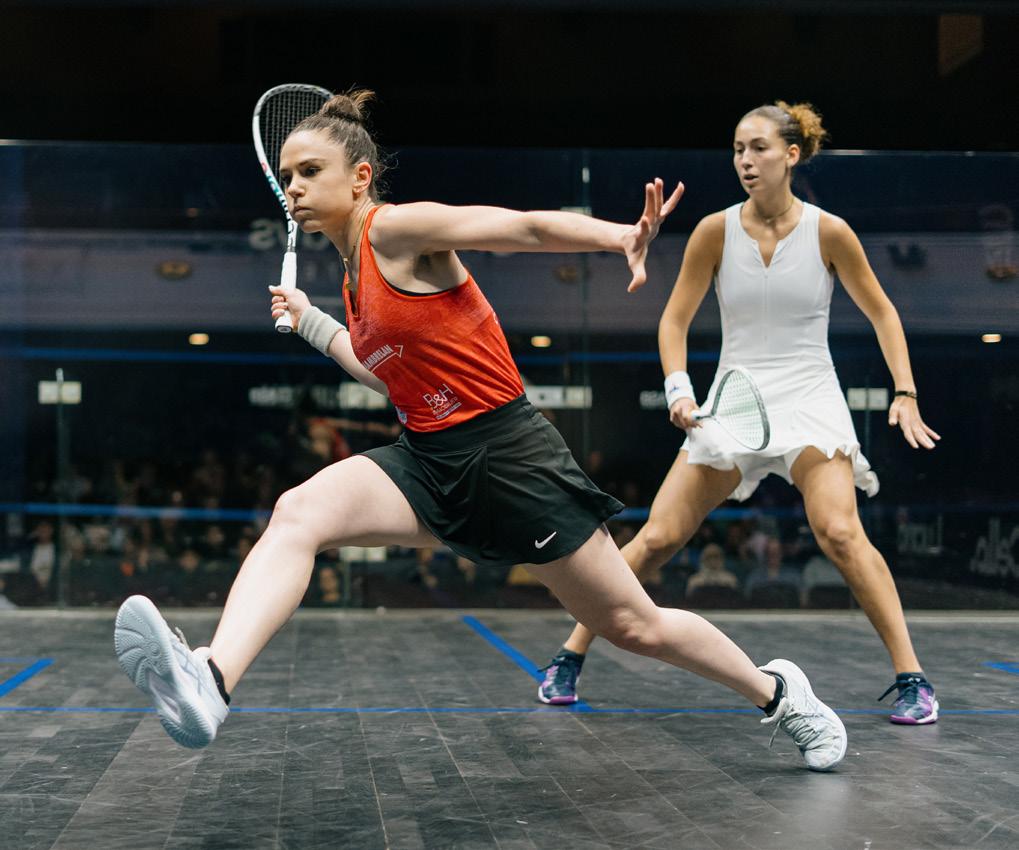

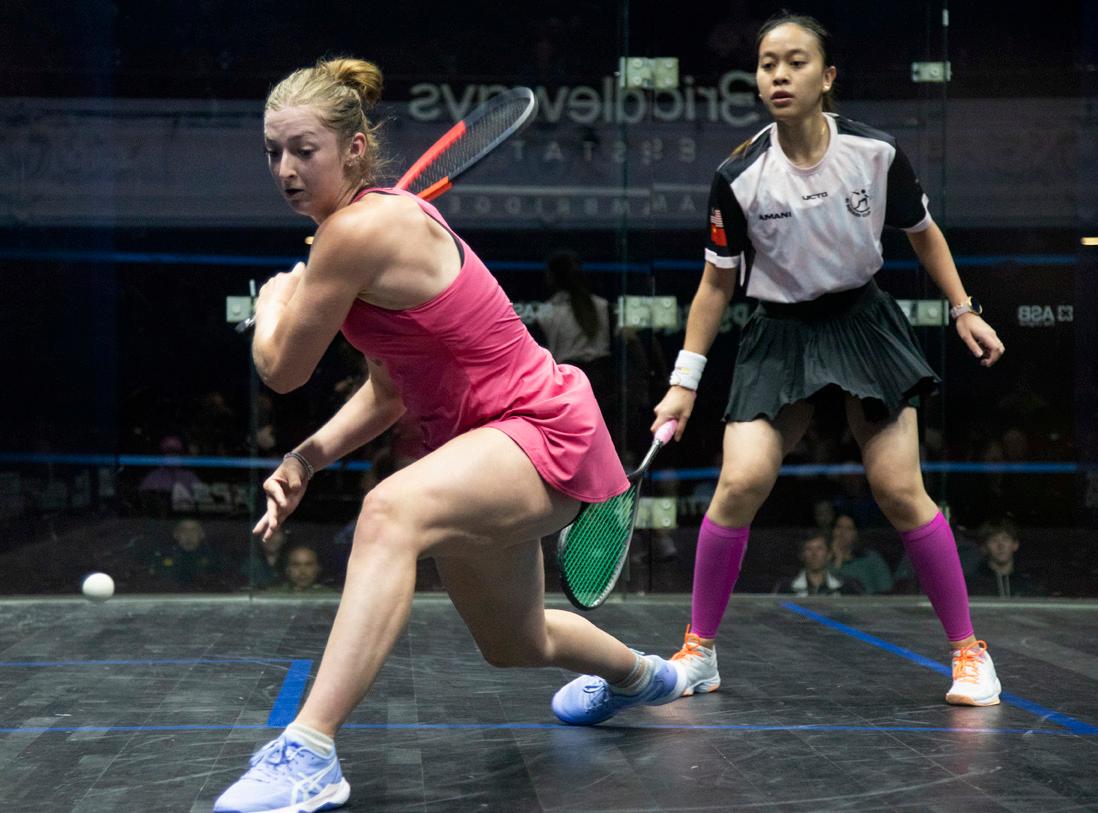
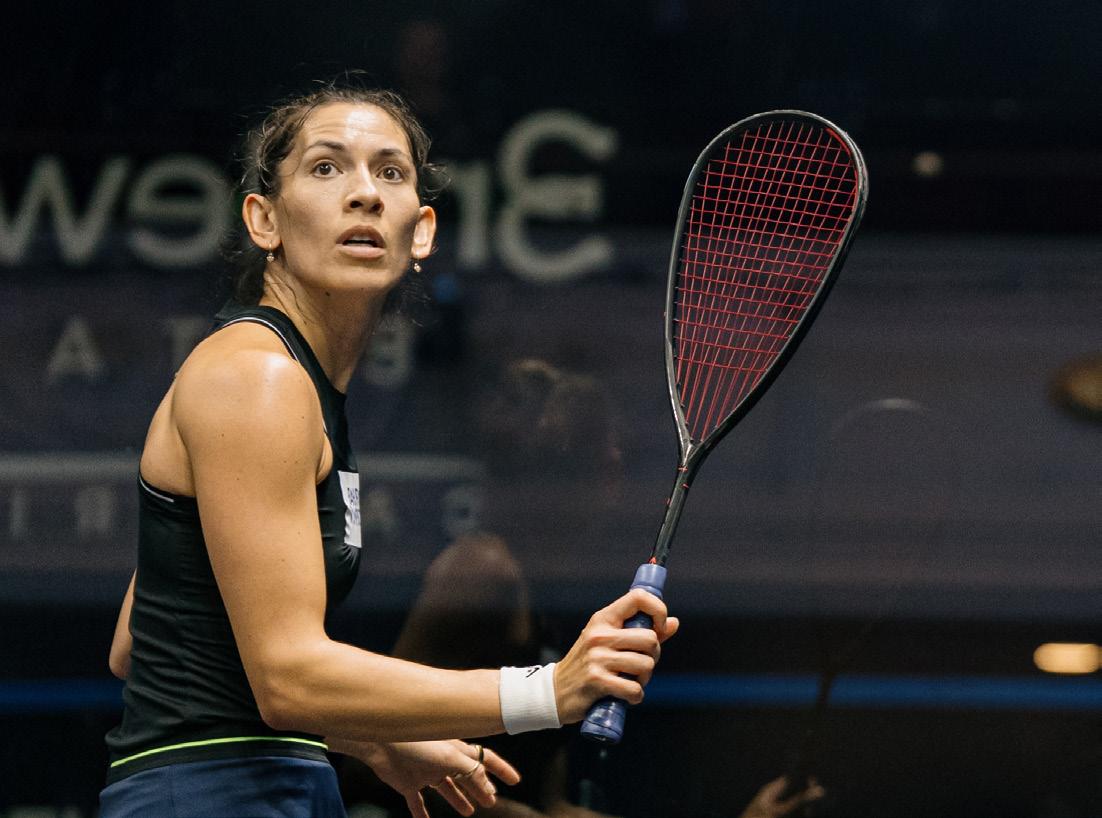
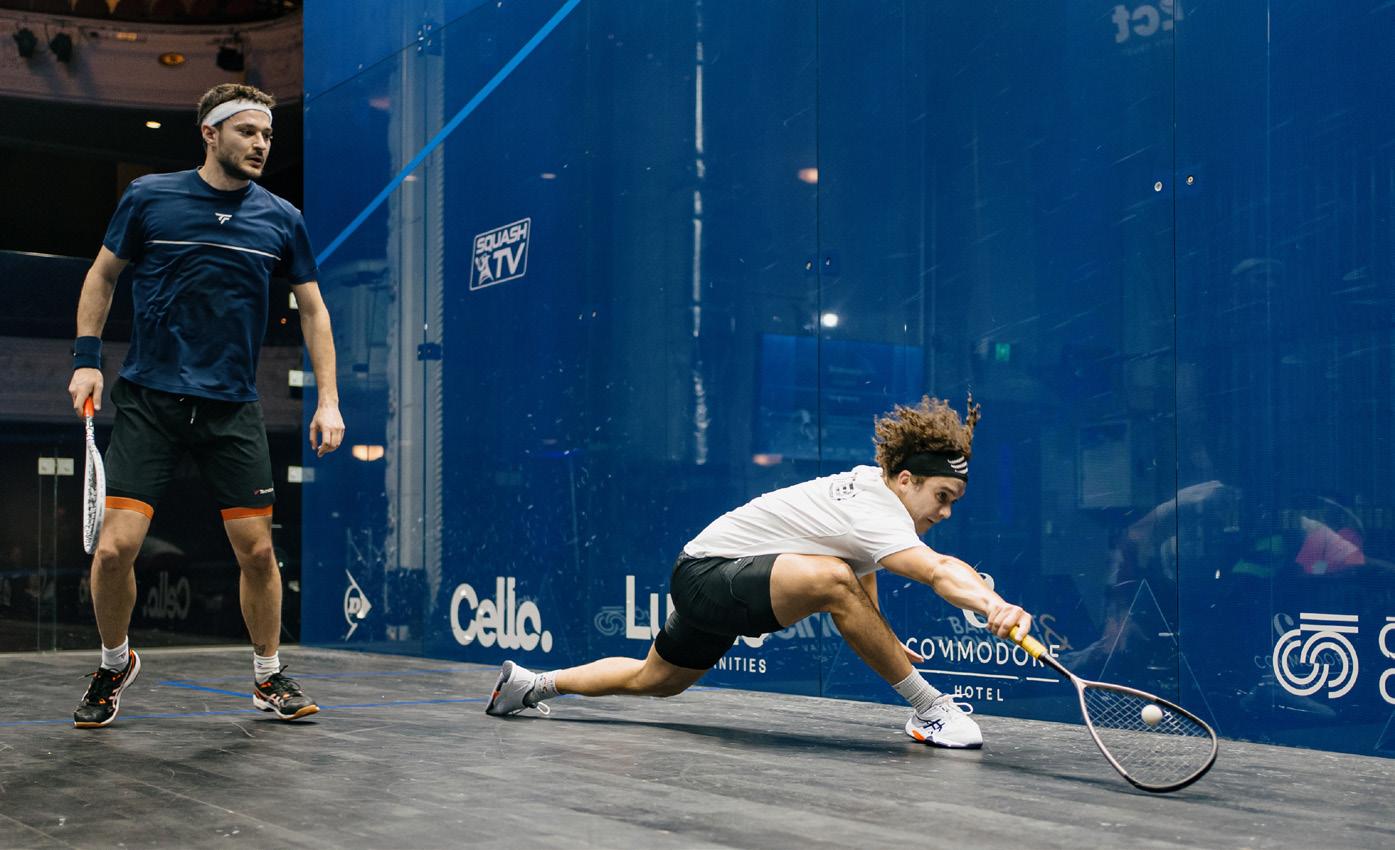



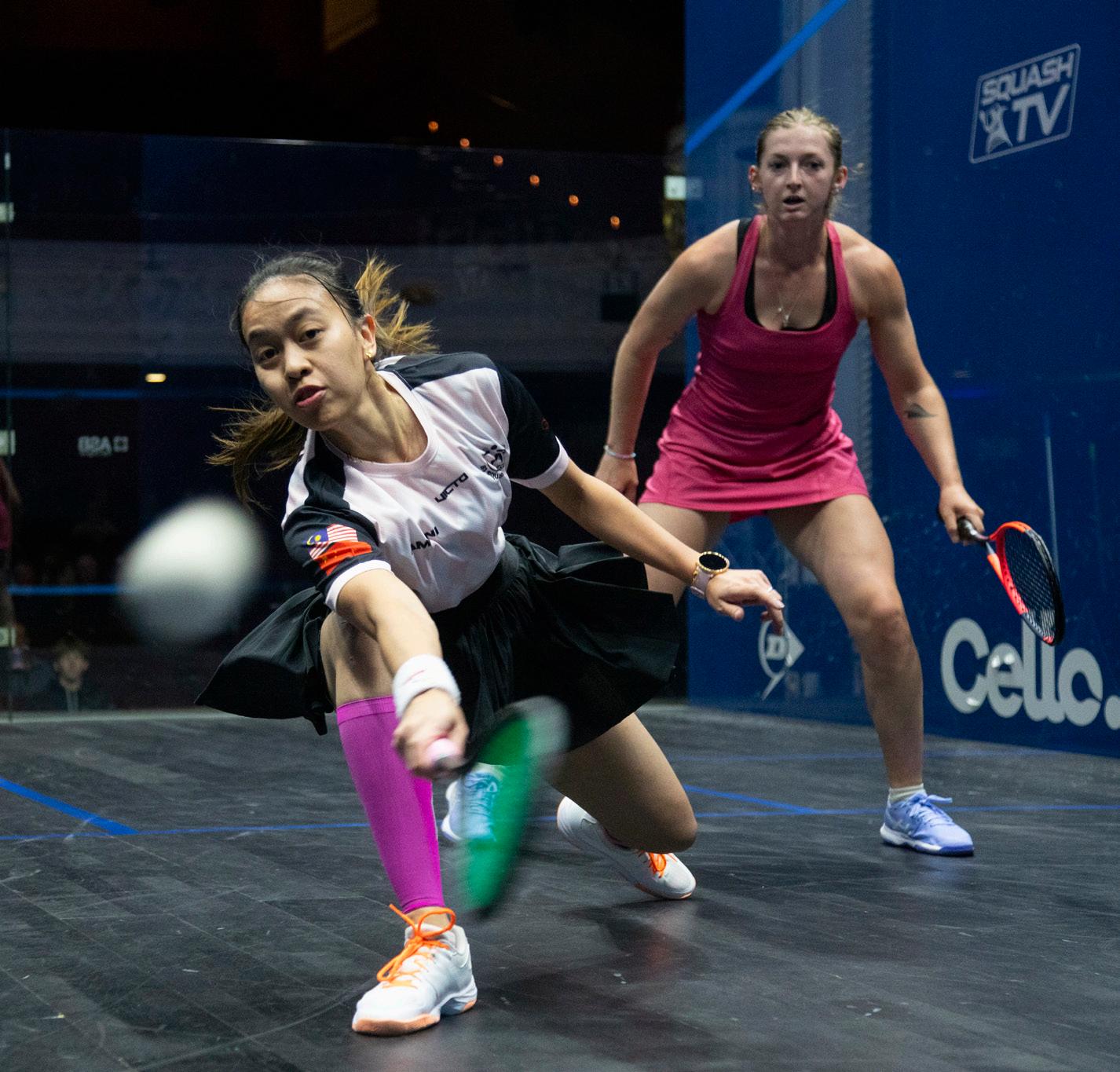
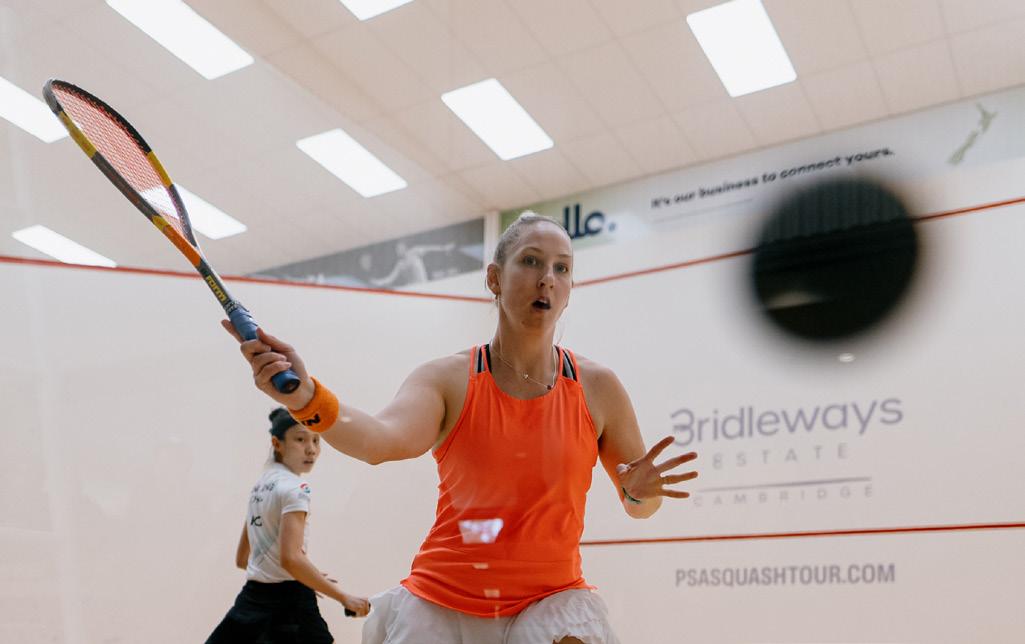
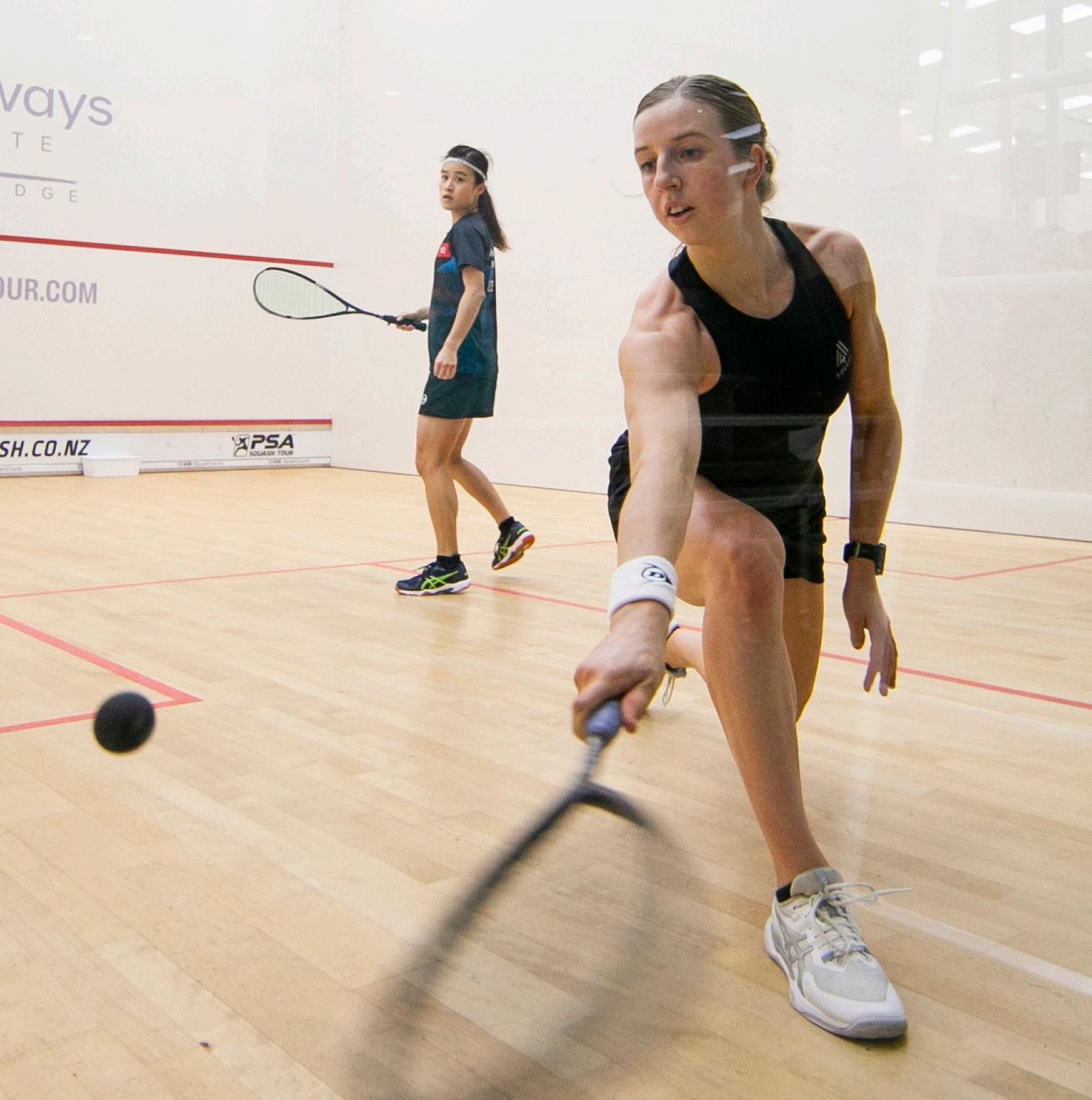
NZ OPEN WILL BE BROADCAST LIVE ON

Matches will also be live on Squash TV
The next Player Magazine is coming soon. All MySquash Members will get free access.

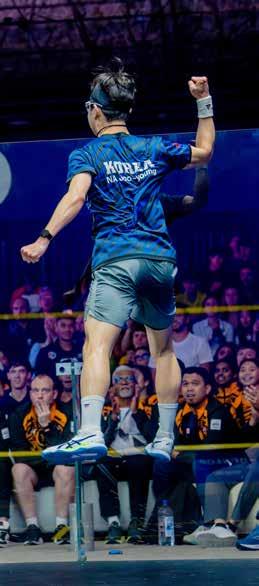
Picture this: a system so generous it pays home-grown squash players a comfortable six-figure salary to grace the courts in a premier domestic competition. A setup so nurturing, it provides everything a rising star could ever want—except, perhaps, a reason to leave. Sounds like squash-player utopia.
The cities of Alexandria and Cairo dominate the imagination when one speaks of squash, the fertile crescent from which champions are endlessly born. It’s Egypt, after all, that has shaped the modern game, where players like Ramy Ashour, Amr Shabana, Raneem El Welily, Ali Farag and Nour El Sherbini don’t just win trophies—they redefine the limits of possibility.
It’s easy to assume that such financial riches would only flow in the Nile Valley - after all Farag ($352,696) and El Sherbini ($301,499) were the highest earners in the pro game during the 23/24 PSA season.

But if you shift your gaze eastward, beyond the familiar, to a country more famous for K-pop idols than sports icons, you find a surprising source of wealth in the squash world. Welcome to South Korea, where success is nurtured, not chased; where young prodigies like Jooyoung Na don’t just play to win—they play to stay.
Na’s remarkable run at this year’s World Junior Championships was a revelation, a moment when South Korean squash announced itself to the world. His five-game, come-frombehind victory against defending champion Hamza Khan was more than an upset - it was a signal.


BY NATHAN CLARKE
“The country’s squash system is, in many ways, a gilded cage. The top players are offered contracts that allow them to earn up to $100,000 a year, simply by staying within the confines of their home country.”
In Houston, Na became the first South Korean ever to reach the final of the prestigious junior tournament. Although he fell to Egypt’s Mohamed Zakariaa player tipped to ascend to the very summit of the game - the message was unmistakable: South Korea was here, and it was not to be overlooked.
For Na, the victory was not just personal but a triumph for his nation. “I was so happy and couldn’t believe that I was the first Korean to advance to the individual final,” Na reflects. “I feel like I made my country proud. I was really happy because I did my best in each game and got good results.
“It is the biggest junior competition in the world, I prepared a lot for this competition and participated in it with excitement. Since a Korean player had never performed above the round of 32 in the World Junior before, I tried not to get too greedy and did my best in each game. However, when I won the match against Hamza Khan in the quarter-finals, I became convinced of my ability. As a result, I think it became an important turning point in helping me believe that I could contribute to the team with good results as well.”
These are not just the ambitions of a young athlete but the heartbeat of a nation unfamiliar with sporting excellence in this realm. Na’s success was a seismic event for South Korean squash, sending ripples through a community that had never before believed itself capable of competing on the world stage.
When Na, and his compatriots, helped stun hosts USA to book South Korea a place in the men’s team final a few days later - another first for South Korean
squash - their performances were not only a breakthrough but a glimpse of a future where South Korea could become a major player in squash.
Yet, as we celebrate this remarkable rise, one cannot help but wonder if South Korea’s nurturing embrace comes with a hidden cost.
The country’s squash system is, in many ways, a gilded cage. The top players are offered contracts that allow them to earn up to $100,000 a year, simply by staying within the confines of their home country.
It’s a rare, if not unique, proposition in the sporting world - a chance to play professionally without the ceaseless grind of international competition, without the weary miles and passport stamps that are the hallmarks of a professional athlete’s life.
Sean Oh, a Canadian coach with Korean heritage, lays bare the dilemma: “Take a player like Jooyoung Na - he will be finishing high school next year and then he can either go to study somewhere like the US Ivy League system, or he can stay in Korea and play for a team here, earn a very good salary and live comfortably.”
This domestic paradise, however, raises an uncomfortable question: when comfort becomes the cage, what happens to ambition? Oh continues: “We have a really unique system in South Korea where players play for their region, or city, once a year in a major national tournament—the Korean Games. It’s like a mini version of the Olympic Games, contested between the different regions within Korea. It’s city against city, and is connected to politics and state pride.”
“Each team (there are about 14) has three players, and top players in teams can earn
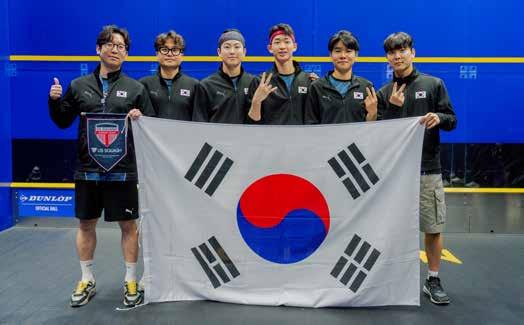
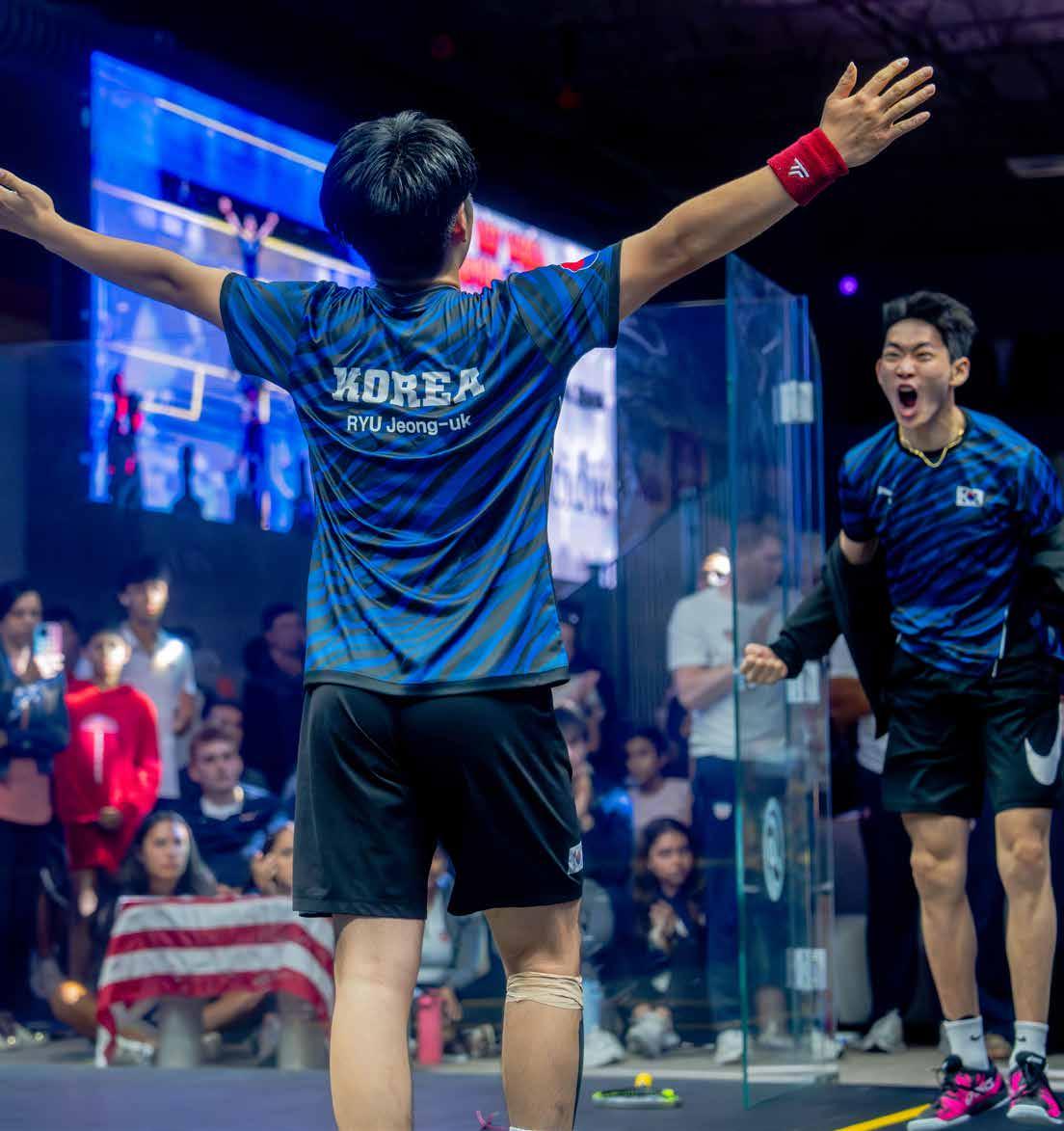
“In the world of South Korean squash, every player knows the stakes: leave the comfort of home, test yourself against the world, and you risk it all. Stay, and you live well, free from the anxieties of rankings and results.”

an annual salary in the region of $100,000 - and those players will be on mostly twoyear contracts, which are then renewed, on the basis that, come the time of the Korean Games (staged in Autumn) they will be available to compete for their team.
“So the best South Koreans can earn world top 20 money just for competing in South Korea, they don’t have to join the PSA Tour and fight for rankings and travel around the world competing at small events to build up a ranking - they can stay at home and live comfortably.
“This system is, I think, one of the reasons we don’t see any South Koreans on the PSA Squash Tour.”
In this zone, the intensity that burns in the hearts of squash’s greats - the drive to conquer new challenges, to measure oneself against the world’s best - is dulled. In Korea, the fire is domesticated, its flames kept in check by the allure of stability, by the assurance of a decent living without the need to prove oneself on the global stage.
For Seojin Oh, a key figure in the South Korean junior team, the thrill of competing on the world stage in Houston was eyeopening: “The World Juniors was a great event and great experience for Korea squash. We targeted the bronze medal in the team tournament but didn’t expect to go to the final. It was amazing and an honour to go to the final. In Houston, we showed Korean squash to other countries and were so happy that squash-related people from all over the world became interested in Korean squash.”
Seojin’s pride is palpable, his words reflecting the joy of discovery, of realising that South Korea could stand tall among giants. But his statement also hints at a realisation that the comforts of the Korean system might be both a blessing and a curse.
“I also realised that the world wall is not ‘that’ high,” he said he said - a phrase loaded with possibility and contradiction. The wall may not be high, but it still exists, a barrier defined not just by geography but by mindset.
It’s a double-edged sword that South Korean squash wields, one that grants security but risks stifling the very spirit that fuels greatness. The players are protected, but is it at a cost? Can one truly reach the summit of sport without the crucible of international competition, without being tested in the most demanding environments?
“The other side is that the money is all linked to competing at the Korean Games,” Sean Oh explains.
“If a player takes a contract with a team, then joins the PSA and gets injured or for any reason has to miss the Games, they have to pay the money back to the team.
So to go pro, compete in enough events to get a good ranking divisor (players must compete in around 10 events per year on the PSA Tour to qualify for a ranking divisor) and push to go up the rankings, there is a lot of risk.”
In the world of South Korean squash, every player knows the stakes: leave the comfort of home, test yourself against the world,
“The Olympics, that grandest of stages, may indeed be the key that unlocks the door to the world for South Korean squash.”
and you risk it all. Stay, and you live well, free from the anxieties of rankings and results.
It is a difficult choice, laid bare by the peculiarities of politics, pride, and economics.
But for Jooyoung Na, the call of the world outside is strong. “I think I’m going to join a professional team in Korea but I also want to perform well as a professional player on the PSA Tour,” Na says, his ambition shining through.
“I also have the ambition to become the first Korean player to do well at the Asian Games and Olympics. It’s definitely very meaningful to me that squash has entered the Olympic Games. It’s a stage that every sports person dreams of, so I want to play in the Olympics.”
The Olympics, that grandest of stages, may indeed be the key that unlocks the door to the world for South Korean squash.
“When I think about squash playing in the LA28 Olympics, it is very exciting,” Seojin Oh adds. “It’s my next goal to be a member of the squad playing squash there. So to achieve it, I need to be focused, practice, and participate in PSA events and get good results.”
For the wider South Korean squash community, the inclusion of squash in the Olympics could be transformative.
“I think the Olympic Games could make a big change to squash in Korea,” Sean Oh says, his voice carrying a note of hope.
“I think we will see more young players coming into the sport—from the overly competitive sports like soccer, etc. More players should increase the level, and the success of the team in the World Juniors shows that we may have the talent here to compete at the world level. Add a good domestic earning potential and the possibility of competing at an Olympic Games, and squash becomes much more appealing than it has been in recent years.”
For Jooyoung Na and his generation, the question isn’t just about how good they can be; it’s about how far they’re willing to go to find out. The world outside waits, but to step out, they must first be willing to leave everything they know behind.
And so, the Korea conundrum remains: in a world where comfort is the ultimate currency, can ambition find a way?
The answer may well define the future of South Korean squash.
Wednesday nights at Whangarei Squash Club are usually filled with lots of competitive squash followed by lots of social beverages. The club organises a competition called, ‘SquashMax’. Players from the club and surrounding clubs can enter and play for grading points. Shelley Kitchen (Club manager) matches up players and a draw is created usually containing 50 or so players every Wednesday. Many club players look forward to this night as there is decent squash to play and watch, plus the bar is open!
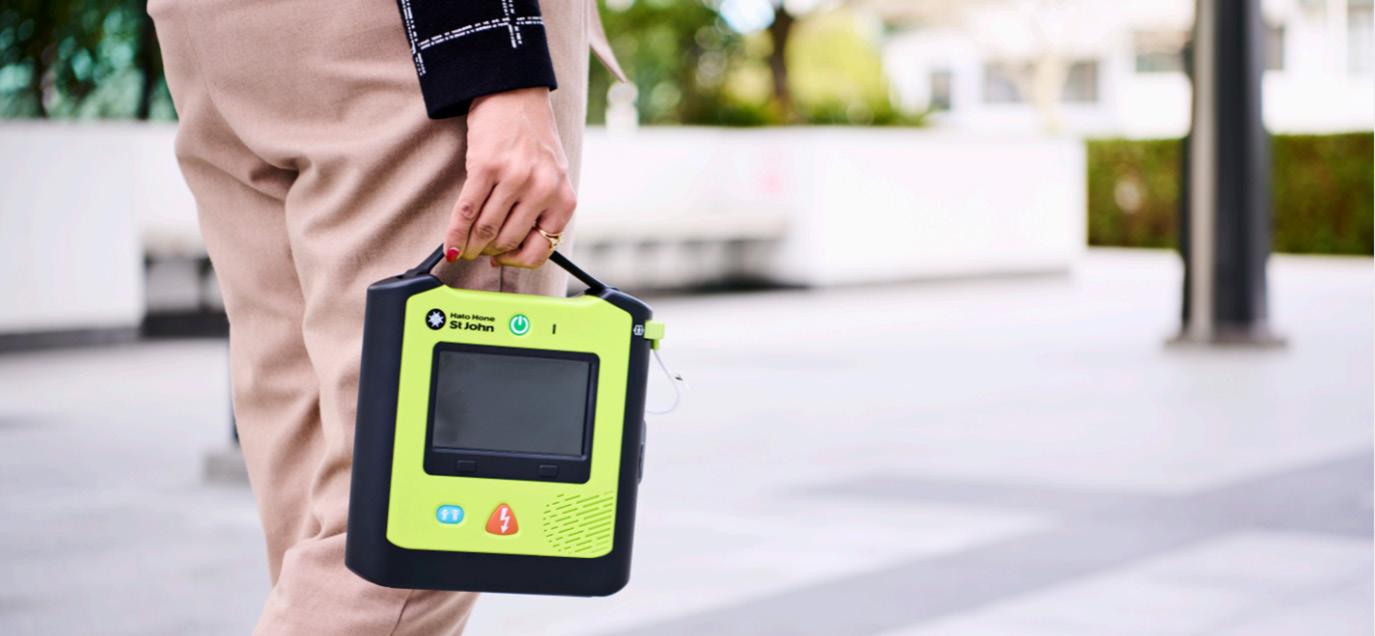
However, on Wednesday 12th February SquashMax was filled with drama due to rare event. Gary Saunders, a regular at SquashMax and stalwart of Whangarei and Northland squash was playing another c-grader on Court 3. Gary was having his usual battle, chasing everything, until suddenly he hit the floor boards, face first and lay motionless on the Kauri floor. His opponent Benji was surprisingly stunned. In the seconds that followed, those members who were watching were waiting for some movement. Unfortunately, that movement didn’t arise. Two members from the balcony kicked themselves into action. Calvin and Nacho both ran down as fast as they could. They turned Gary over and he had gone extremely purple, Calvin assessed him quickly and immediately started CPR. At the same time Nacho went to get the Defibrillator (kept near the Manager’s Office). Nacho quickly ripped off his shirt, opened the Defibrillator and followed the instructions. In the meantime, another member - Ari had lifted his legs and Calvin continued to perform CPR.
All of this, due to extremely quick thinking too just over 2 minutes before the first shock went into Gary from the Defibrillator. On the first shock he gasped for breath after being ‘gone’ for just over 2 minutes. The overlooking crowd also gasped for breath out of sheer relief for Gary. Another 8 minutes passed and the Paramedics arrived. By this time Gary had settled, however he was not out of the woods yet. He was taken to Whangarei Hospital where he was given treatment to stabilise him and his heart. He was flown to Auckland that night. Delwyn (his wife) and one of his daughters drove down whilst he was in the air. The next day he was given a stent to unblock the offending coronary artery.
He is now recovering and looking into selling his squash rackets to go towards some golf clubs or some bowls! We at Whangarei SC wish him and his family
all the best in the future and hope he recovers swiftly. Gary has been a regular volunteer and supporter of Northland Squash for many decades. His wife Delwyn is a regular player and all 4 of his children play to a decent level.
The events of Wednesday 12th February will never be forgotten by some of the squash playing community at Whangarei SC. This event really highlighted the importance of good, quick-thinking people at a sports club and also the importance of a fully functional and well-maintained defibrillator machine. These machines do not get used often, however when they do get opened, they are of ‘life-saving’ importance. In this case there was a happy ending for Gary, his family and all the good people at Whangarei SC.
Most funders will approve a grant for a defibrillator or sometimes your local Council will provide them at a special rate. Make sure your Club has one.
Research undertaken by St John shows there is a 13% chance of survival from a cardiac arrest outside of hospital.
Each year St John publishes its Out of Hospital Cardiac Arrest Report and this year’s study reveals that while survival rates remain constant, there is much more we can do to save lives.
Read the full article at St John’s website HERE
Pirates has gone from strength to strength in membership and public participation; particularly their beginner and junior programs. $5,000 was invested in an oversubscribed junior program which was free to all members and the community.
This was so successful extra nights were added to the program. A new social doubles tournament open to anyone was introduced. Two fully booked and waitlisted “Have A Go” beginner programmes. Social leagues off the back of Have A Go were introduced to ensure continuation into the club. Regular club trips with shared accommodation (players and non-players encouraged to join) for events such as Southland Open, Trident Homes PSA, Queenstown Easter Open, Fiordland Open, and various other shenanigans. They hosted “Squash the Stigma” whereby Pirate member, Connor Ellis, played for 6 consecutive hours against 18 opponents of varying grades to raise $5,000 for Youthline Otago. This event was attended by members of the general public, and he smashed his fundraising goal! They’ve revamped their website and social media outreach whereby the Pirates Facebook page alone reached 10,000 individual accounts around the country in 2024, and the Pirates interactive group posts were viewed over 25,000 times.
Pirates hosted the Otago District’s first ever international PSA tournament which attracted professional players between world number 80 and 200, from 8 countries. A successful amateur tournament ran alongside, where many of the top local players had the opportunity to play against the 1st round eliminated players from the PSA draw. Pirates submitted a composite C grade woman’s team in the Superchamps. They won their grade (bringing the Shield back to Otago for the first time since 1996) and contributed two players to the composite D grade team (who were thrilled to beat their seeding!) Two Bayfield High school boys teams played at the District schools playoffs and went on to represent Pirates and their school at Nationals. They were proud to send off two Pirates girls as part of the Trinity College team! At the NZ Men’s/Women’ Team Championships they had 3 Pirates members who represented the Otago District. They’ve upgraded the electrical wiring of the kitchen/ bar area and refurbished backup heating for the courts. They’ve restocked their bar with a move from bottles to cans wherever possible and replaced all plastic plates and utensils with eco-friendly/compostable options.
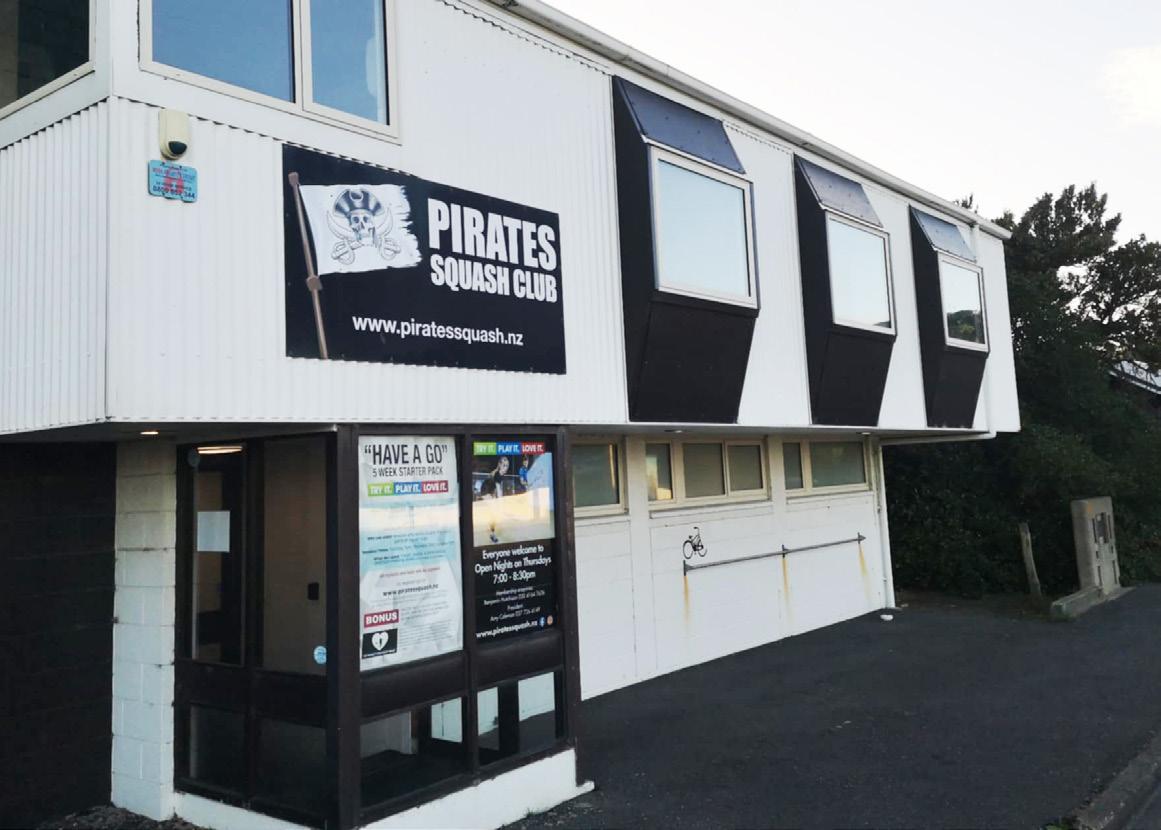
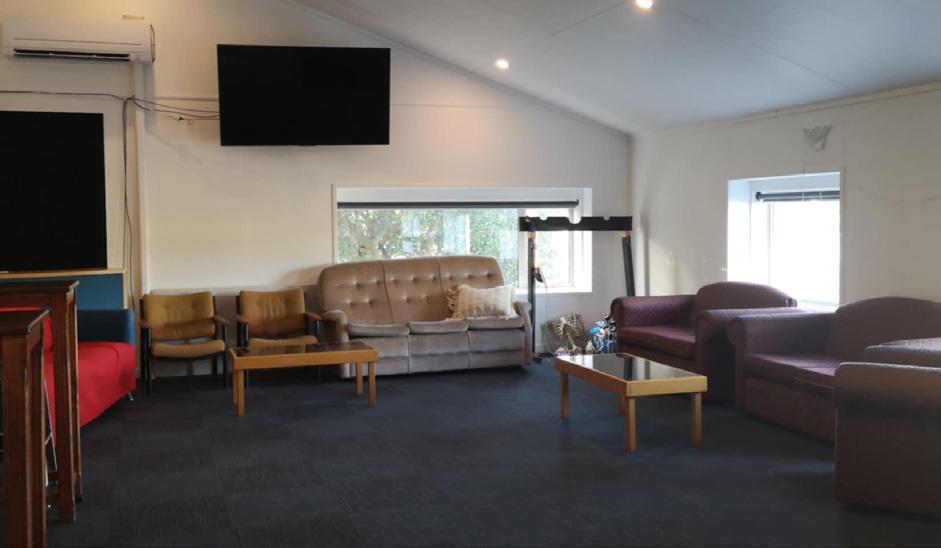
They successfully applied for a grant to renovate the entrance, repair the roof, purchase new furniture, and replace aging net balustrade with modern safety glass. This work is currently under way. They’ve also purchased a larger TV for the foyer to display scoring and a new digital noticeboard.
Two Pirates members serve on the Squash Otago District Board, showing the club’s commitment to squash in the region. 7 out of 9 attendees at the midyear Dunedin coaching clinic run by Squash NZ were Pirates members.
After 2 years of declining membership and making a financial loss, 2024 saw an increase in membership and a positive cashflow for the year. A significant grant from Lion Foundation assisting with CAPEX projects was received. They restructured committee roles; promoting accountability and working with strengths to ensure commitment, engagement, and drive in governing and managing the club. This included creating new role descriptions and robust criteria to make sure roles were filled by suitably qualified people. They reinstated the Pirates Open which was the largest club-level tournament in Otago of 2024, which saw the return of significant prize money being given out (over $3,000), and 80 players – plus a waitlist. After 2-3 years of tournaments with only 40-50 entries, this was a very welcome boom.
Membership Drive
The season kicks off in February with an inter-business competition, open to members and non-members.
Teams of five players, encouraged to include at least one non-member.
16 teams in the current competition. Some enter as full teams, while others are formed by the club.
Matches are 3 minutes warm-up, 12 minutes continuous scoring.
Scoring system:
• 3 points for an individual win, 2 for a tie, 1 for a loss within 5 points.
• 2 bonus points for an overall team win.
• 10 bonus points if a non-member joins before pool play ends.
Competition format:
• First two weeks: random draw for initial seedings.
• Next three weeks: pool play (teams placed into four pools based on seeding).
• Final two weeks: semi-finals and finals.
• Entry fee: $50 per team, primarily for prizes (engraved handles & bar vouchers).
• Goal: To create a welcoming, social atmosphere to encourage new members.
Membership offer:
Regular membership of $120 reduced to $60 for new members. One new member wins a spot prize refund of their fee.
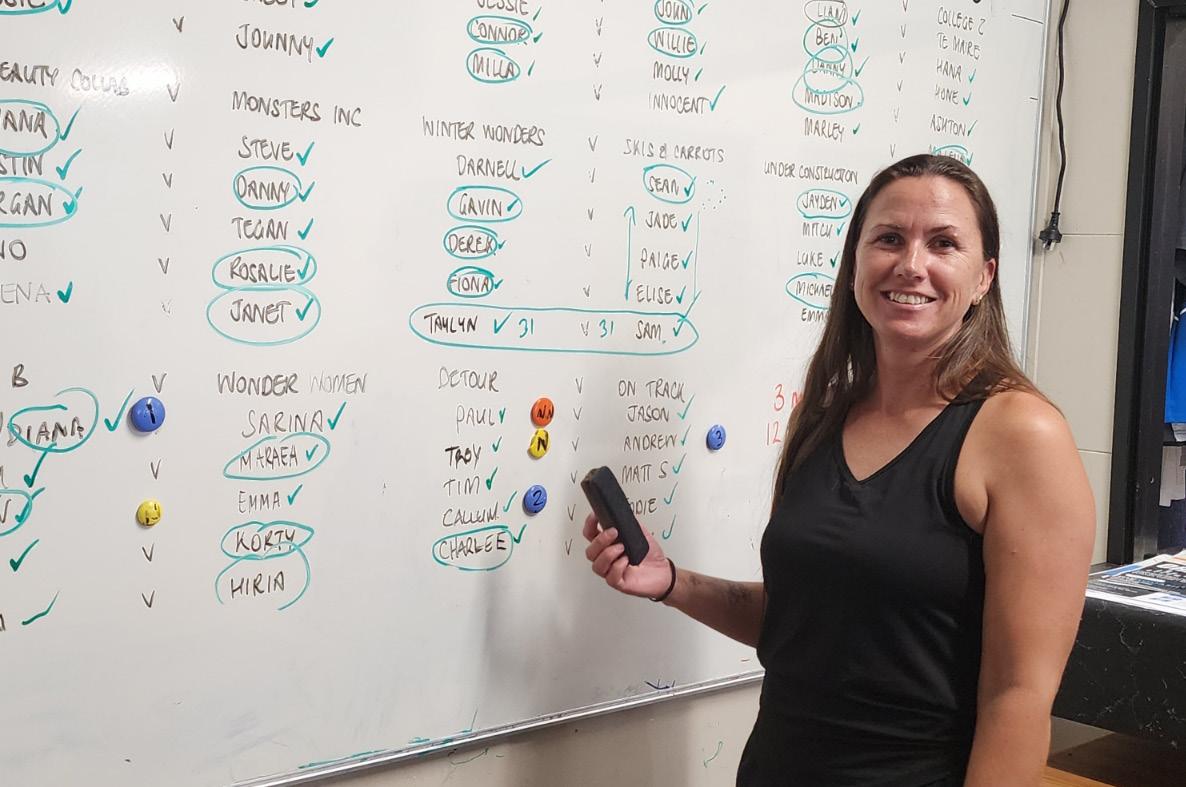
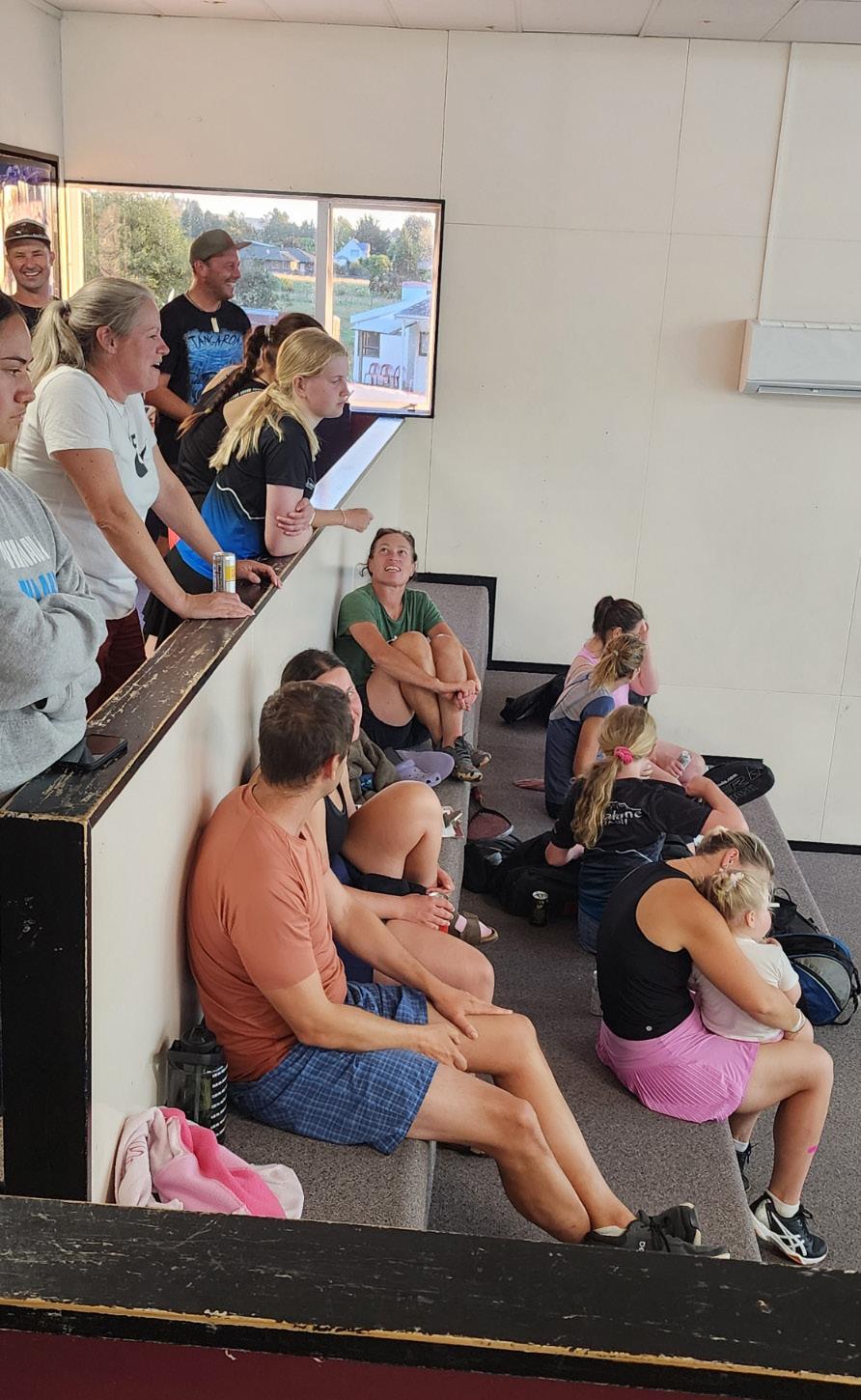
Designed to retain new members from the interbusiness event.
Open to club members only—non-members must join to continue playing on club nights.
No entry fee, but new members can still join for $60.
Six evenly ranked teams of typically 15 are created, adjusting for families where possible.
Matches are best of five, first to 11, sudden death at 10-10.
Scoring system:
• Winner earns 10 points for the team.
• Loser earns 1 point for every 6 points scored in the match.
• Ensures every game counts, even for expected mismatches.
Match scheduling:
• Three time slots each Thursday night (e.g., 5:00 PM, 6:30 PM, 8:00 PM).
• Instead of teams rotate through courts have two teams get all courts
• Players can reschedule by mutual consent at an earlier time.
• Players can fill in at a higher team position, but not lower.
Keeps membership at 150+ in a town of just 1,200.
Strong community focus, with extended family and friends attending club nights.
Bar & kitchen generate more revenue than membership fees.
Ruapehu College Squash runs the kitchen, fundraising for NZ Secondary School Nationals.
Recognized as NZ Squash Club of the Year and has produced toplevel juniors, including two players in the NZ team to Worlds in the same year.
Family-friendly environment: Whole family membership for $200.

John Laurenson, club president and former Ruapehu College teacher, has been instrumental in the club’s success since helping establish the courts in 1993. His son, Matthew Laurenson, now teaches at the college and leads junior development.

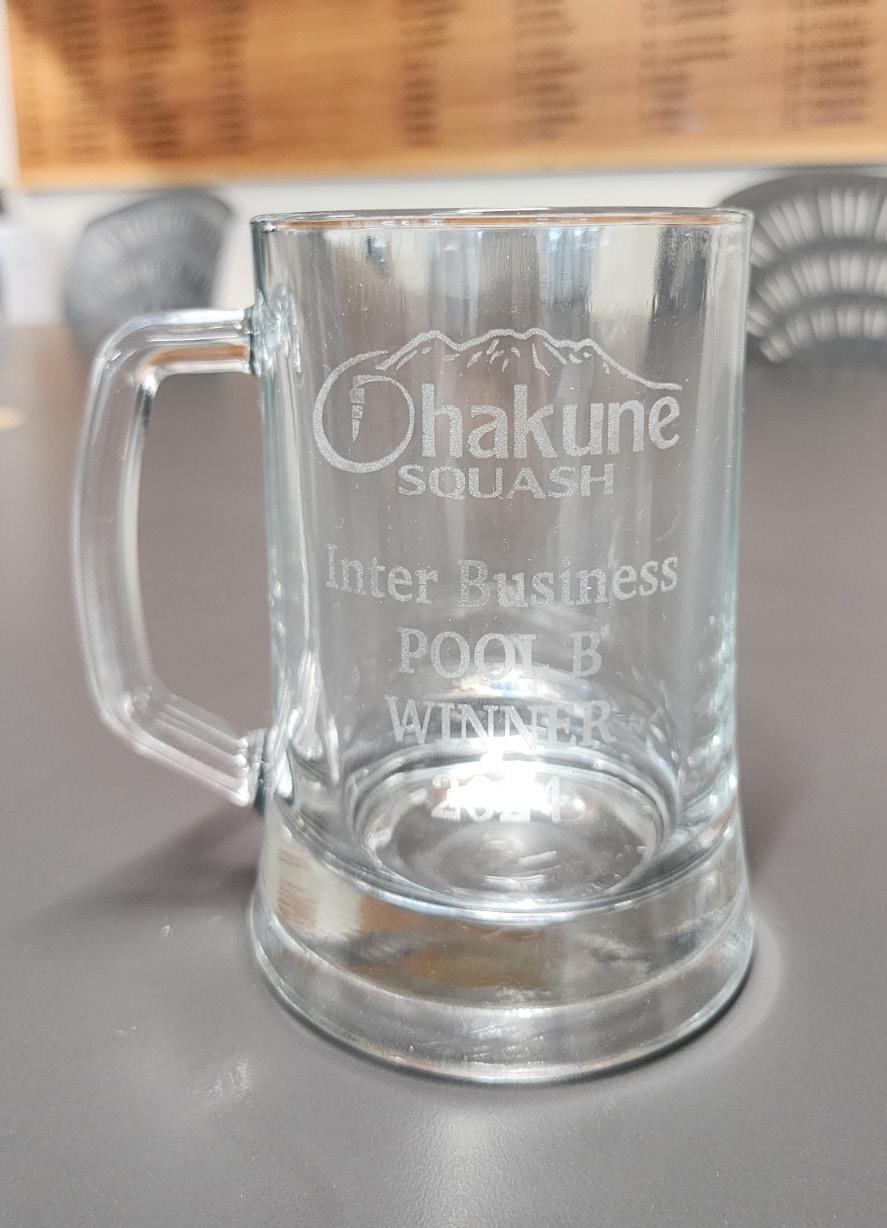
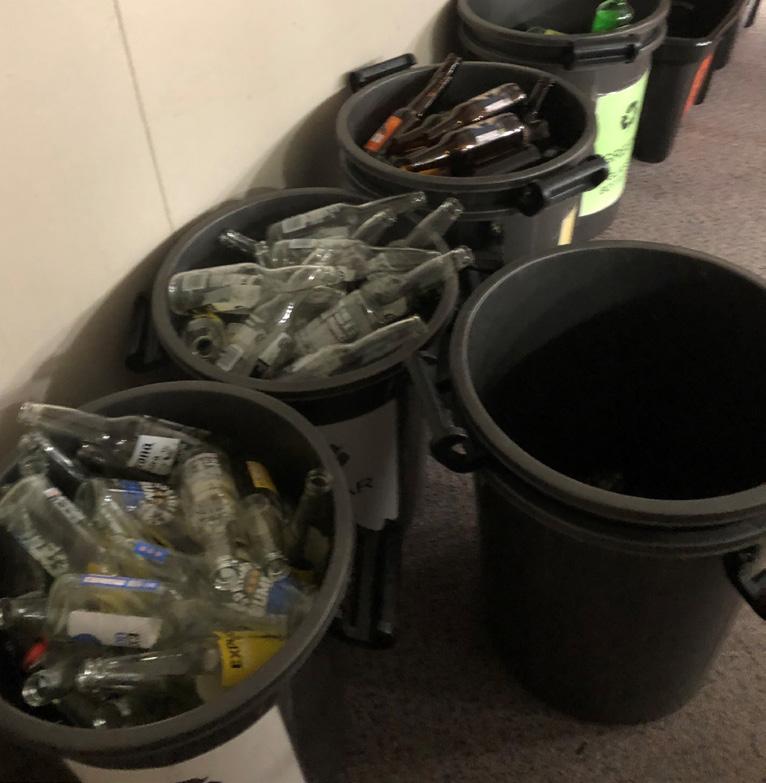
A few questions we asked about the project:
Reason for the upgrade:
The Waimea Squash Club which falls under the umbrella of Club Waimea in Richmond, Nelson completed an extensive upgrade of their kitchen and bar facilities in February, marking the completion of a strategic plan project that was first raised in 2017. Initially, the plan was to replace worn bench tops in a kitchen that was now 47 years old but had lasted well due to maintenance and help from members. In 2023 the committee decided that a full kitchen and bar upgrade would provide better future value for our growing club and affording them opportunities to hold larger events. The Club has a healthy fundraising culture, and so with event funds and ongoing wall and tin sponsorship income, they are proud to have fully funded this project ourselves.
What did they do:
The project ran through 4 key phases:
Phase 1: Planning and design. Consultations with the kitchen design company began in May 2024 and were locked in after final approval by Club Waimea in October.
Phase 2: Move the bar. The lounge area was cleared to make room for the creation of a new bar on the opposite wall. Whilst we could do without a kitchen during the summer months, it was important to ensure bar facilities remained available at all times!
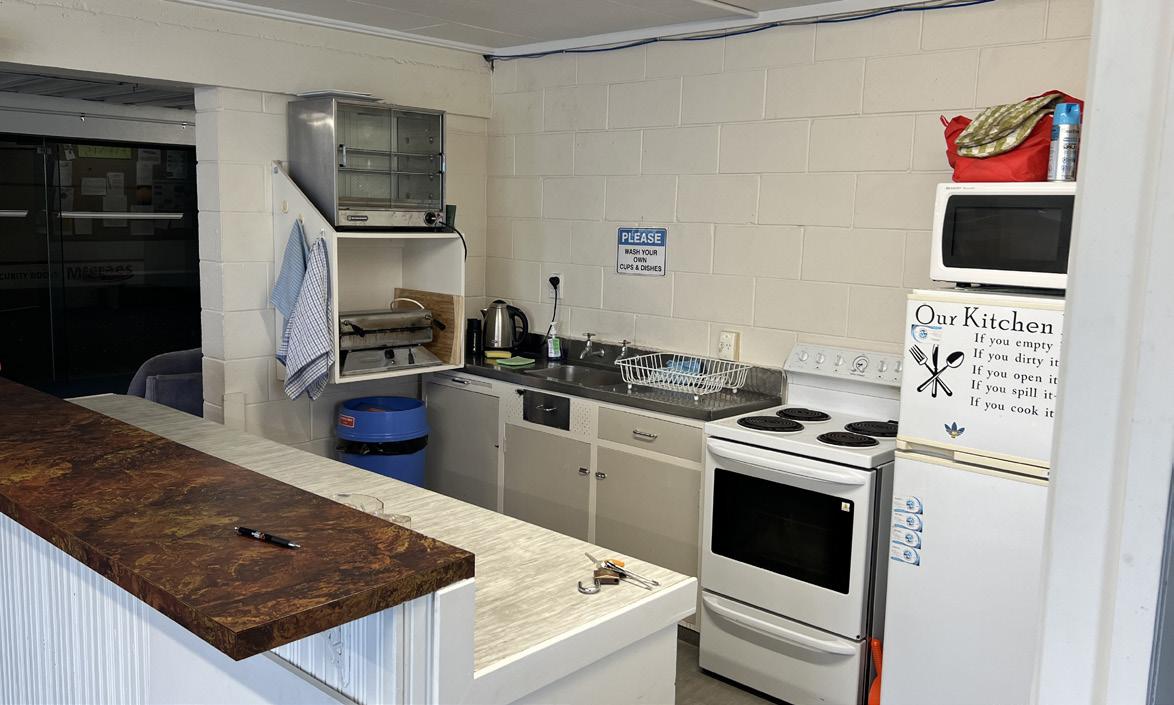

Phase 3: Out with the old. Once the new bar was functional, the existing kitchen and bar were ripped out, and the walls, floors, plumbing and electrics all prepped for the new kitchen.
Phase 4: In with the new. New kitchen installation.
How did they make this happen:
The club is extremely grateful for the commitment and dedication of their loyal skilled members who made up the project team, including accounting, purchasing, installation, electrics, plumbing and many other general duties. The team worked hours in their spare time
to complete both the bar move and installation, and full kitchen refurbishment in 5 months so they can be utilised for the 2025 season and shown off during our signature Waimea Open tournament in May.
The outcome speaks for itself. The new look is sure to create an even warmer welcoming club to new and existing members. “This was a well-coordinated effort that has exceeded all of our expectations and feedback from members has been tremendous. We are looking forward to the official opening celebrations!”
If you want to get in touch with them to find out more, email Barlee at: squashclubwaimea@gmail.com
CLICK ON THE LINKS BELOW FOR TIPS ON:
• Floor cleaning
• Wall cleaning
• Wall maintenance and repair
• Squash court foor sanding
• Squash court foor replacement
• New court lights
• Court heating and ventilation
• Changing room and bathroom facilities
• Lounge facilities
• Kitchen / bar facilities Looking to do an
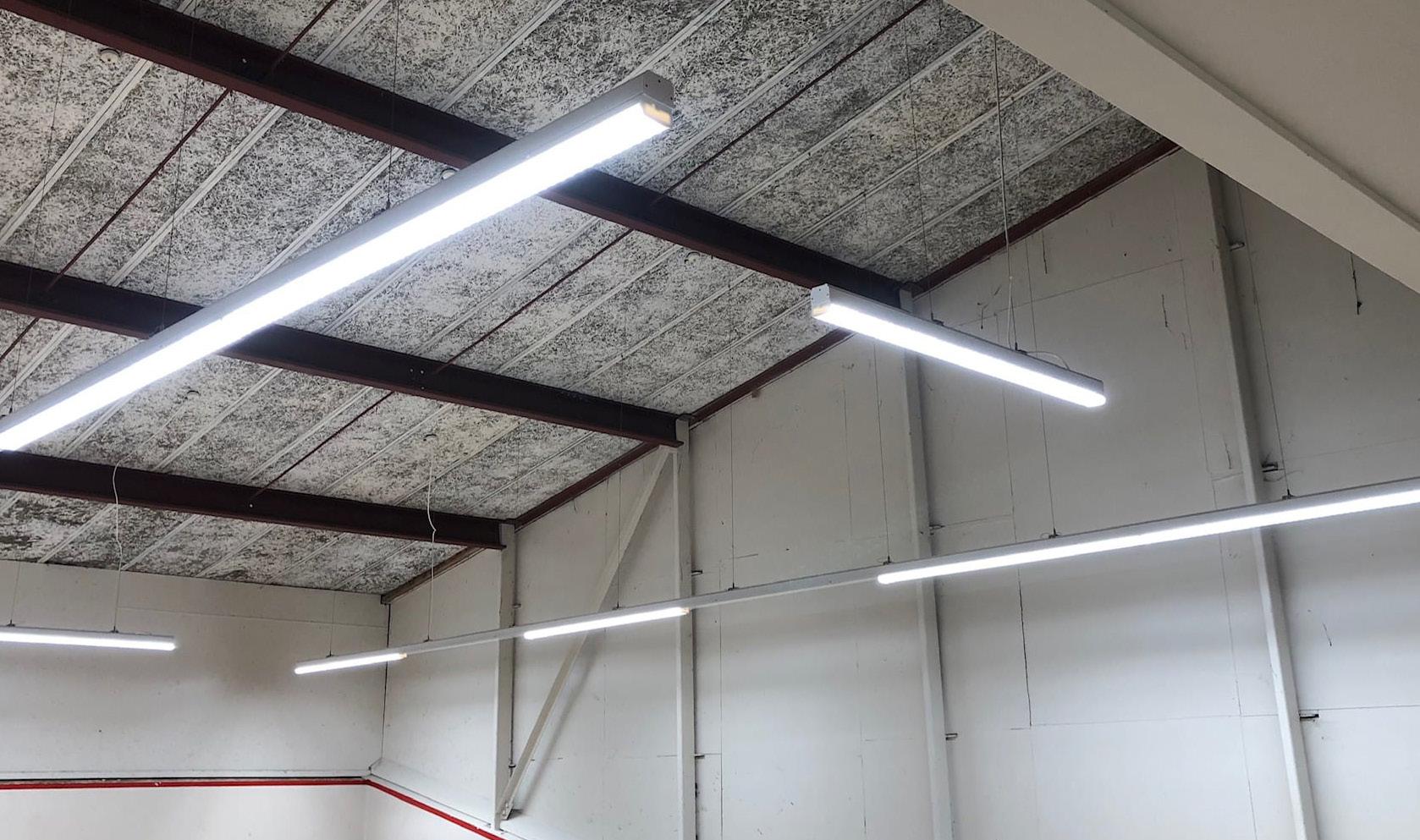
LOOKING TO BUILD A NEW FACILITY OR EXPAND YOUR EXISTING CLUB?
• Needs assessment
• Feasibility
• Facility guidelines
• Design and consent
For information contact our Facility Advisor
Jamie Archibald jamie@squashnz.co.nz
Click HERE to see special deals for affiliated squash clubs








The cost of running a tournament can be high and entry fees do not always cover these costs, leaving clubs to cover the difference. Having a sponsor or multiple sponsors is a great way to help clubs with the costs of running a tournament.
Tournament sponsorship can come in the form of financial contribution, donations of food & drink, prizes, and/or discounts on goods and services.
Process for finding tournament sponsors:
Make a list of potential local businesses you can approach for sponsorship.
Discuss among your committee who potential sponsors may be and prepare a list of businesses to approach. This may be one or two large sponsors, or a few smaller sponsors, if you feel this will have a better chance of success.
Leverage any contacts within your club who may be members with businesses, have key roles within businesses or have contacts within their personal or professional network.
Do some research on each potential sponsor to find out more about who they are, what they support and their values. This will help you determine if there is a good fit and to tailor the proposal.
Create a list of what your club can offer to potential sponsors.
Now you know what you want sponsorship for and who you are going to approach, work out what it is that your club can offer potential sponsors and include in the proposal.
Things to include:
• Court or club signage
• Name and logo on club emails
• Posts on social media platforms
• Logo on club or team uniforms
• Naming rights to tournaments or events
• On-site displays or opportunity to speak at prizegiving’s.
Include member demographics (i.e., number of members, age, gender, where they live), and exposure data such as the size of your mailing list, website traffic data and social media reach stats.
Make sure you are clear on the costs of delivering anything you agree to supply, such as who will pay for signage to be created.
Develop a proposal including all relevant information.
The proposal itself should include:
• A covering letter.
• An introduction containing club and/or event information.
• Details of who your members are or who will be attending your event.
• What you will provide the sponsor and value assigned to these.
Send out your proposal and ensure you follow up.
Now you’re ready to start selling! Start with your list of existing club members - it’s always easier to reach out to those who already know what your club is about and have an association with it
Then work through your list of identified potential sponsors. Some larger companies will have specific sponsorship or marketing teams to deal with enquiries, while smaller businesses may have them directed straight to the owner. If you are unsure who to contact, give the business a call and ask.
Follow-up your proposal with a phone call after a week if you haven’t had a response. Remember, the worst that can happen is they decline the offer but if they never get asked, they can never have the chance to accept!
Once successful, make sure you look after your sponsor and do what you said you would.
You’ve successfully obtained a sponsor for your clubnow comes the time to deliver on what you promised!
Make sure all obligations outlined in your proposal and agreement are completed. Continue to build your relationship with the sponsor and check in that they are happy with how it is going from their end. See what other additional benefits you can offer the sponsor that may arise as you work together.
If sponsorship is for a particular event, follow-up post event for feedback and sound out interest for future events.
To find out more check out our helpful resources. Register HERE

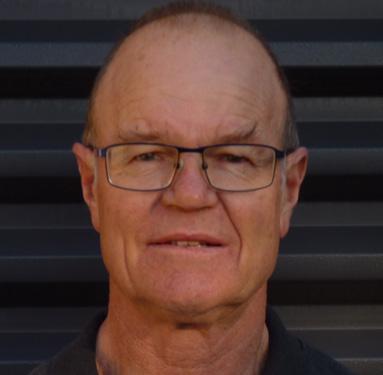
I well remember our revered National Coach, Dardir, talking to a bunch of keen and -soon-to-be A Grade kids on court 4 at the Christchurch SRC sometime around 1973. “In the hit up I hit the ball to you, you hit the ball to me”. Also, a line in a book by Barrington where he confessed to “occasionally being impolite and hitting two to himself.
Contrast those with something I witnessed at the Auckland Junior Champs in 2024. A young girl, U/15 I think, played about 10 shots to herself down the forehand wall, then played a straight drop from the back that hit the tin. She trotted forward to retrieve it, and I thought now her opponent will get a turn. But no, she proceeded to play a better straight drop and then hit the ball back down the forehand wall to no-one! She trotted back, hit one down the wall to herself again, and then hit it across court to her opponent who had waited, patiently or hopelessly, I could not tell.
Both these girls had clearly had some coaching (would anyone enter the U/15 girls without any??) and yet apparently the hitup was not coached. Or was it?
The Rules ( I read some on the wall in a club in Christchurch just this year) say the hitup should be “shared evenly” and that “once the served is played the players return the ball alternately until...”.
Demanding an answer from the local Rules guru I was told it is the referee’s job to ensure the hitup is shared evenly. In the Auckland U/15 girls who would imagine that the junior girl referee would dare to speak up and make a player share evenly, or even have read the rules of the game.
The hitup is not a time for solo practise. It is a time to get moving, to get the feel of the bounce of the ball
The hitup is not a time for solo practise. It is a time to get moving, to get the feel of the bounce of the ball, of the court and it’s noises and smells, and of getting the flow of the ball off you opponents racket. I have hitup against several world champions. They did not hit to themselves!
A decade or more ago I happened to get behind the glassback one interclub night and saw multi-National
Champion Sarah Cook in play. “She looks grumpy”, I said to an old friend watching. “It started in the hitup,” he replied, “ the kid wouldn’t hit the ball to her.”
My return to interclub at age 65 after a 20 year gap started with a similar occurrence. I desperately needed to get moving, to get some flow. But the Uni student I was playing hit seven to himself, then to me, I hit it back, seven to himself, then to me .... Who needed the hitup most? The old guy or the 20 year old?
After more of this I hit 23 to myself (I counted), then said I need a drink. He continued. When I came back I hit one backhand and said “Spin a racket”. Already angry. Let’s coach a hit up.. “ I hit the ball to you, you hit the ball to me” - alternately.
ROD HAYES
Rod Hayes is from Christchurch where he was Canterbury #1 for a number of years around 1980. He had two years as a full-time player in the lead up to selection for the NZ Team at the World Championships in 1983. He won both the NZ Junior Open and U23 champs twice each, and has represented NZ in Juniors, Seniors, and Masters. Although he had a career as a High School teacher he has coached players for nearly 50 years now including several from the South Island who became National Champions at some level - Phillipa Beams, Sarah Cook and Michael Penman.
We welcome guest writers in The Boast!
If you have something you would like to contribure with, please email admin@squashnz.co.nz for further info.
Player A hits their shot but connects with Player B on follow through and subsequently Player A drops their racquet. Player B retrieves the shot. Player A calls a let as they can’t hit the ball due to dropped racquet.
There are several factors to consider in this scenario:
Was the contact a result of Player B being too close?
Was Players A’s swing excessive?
Rules to look at:
8.9 – Racquet swing – was the swing affected (let) or prevented (stroke)
8.10.1 – If the striker caused the interference by using an excessive swing, no let is allowed
13.2 – Fallen object – A striker who drops the racquet because of interference may request a let.
13.3 – Fallen object – A non-striker who drops the racquet because of contact during the striker’s effort to reach the ball may request a let, and Rule 12 (Distraction) applies
12.2.1 – Distraction – If accidental, a let is allowed
Therefore, it would seem that the fairest outcome in this case would be a let.
Q1: When did the first court get built in the North Island?
Q2: How many World Open titles has Carol Owens won?
Q3. Paul Coll reached the final of the World Championships in 2019. In which country was the event held that year?
Q4. Who is the oldest PSA player currently in the top 10?
Q5: How long was the longest ever women’s PSA squash match? 110 mins, 120 mins, 130 mins, 140 mins.
Q6: Who are the four NZ Open 2025 wildcards?
Q7: Which club is hosting the Masters Club Team Championships 2025 (AD Long)?
Q8: When and where are the Squash NZ Annual awards for the 2024 season being held?
Answers on p37
Do you have a refereeing question or a situation you are not sure about?
Chances are others may have the same query. Send your query to our NZ Referees c/mikejack@xtra.co.nz and we will share the answers with the squash community each month.
Please note – every situation is different and without seeing the exact context (player skill, direction of movement etc) we are giving our responses based on the rules and some guidance on how to apply them.
Mike Allred is one of the country’s most experienced squash coaches. In 2024, he participated in the Coach Mentoring Programme, working with several coaches in the South Island. We had the opportunity to ask Mike a few questions about his role as a coach mentor and his experiences.
What inspired you to become a mentor, and what did you hope to achieve in this role?
I was inspired to become a mentor because I wanted to help developing coaches in the areas they needed most. Many of our conversations ended up extending beyond the court, addressing various off-court aspects. My goal was to guide coaches positively through my experiences and support them on their coaching journeys.
How did you support your mentees’ development, and what challenges did you face in doing so?
I supported my mentees by engaging in open conversations to understand their needs, both on and off the court. This involved regular phone calls and texts to ensure they knew I was available whenever they needed someone to talk to. One of the main challenges I faced was the limited time allocated for mentoring. I believe that mentoring should be a longer-term commitment to be truly effective.

What improvements or successes have you seen in the coaches as a result of the mentorship?
I’ve seen significant improvements in the confidence of the coaches I mentored. By serving as a sounding board, I helped them realise the value of their ideas and abilities. This boost in confidence was a key success of the mentorship programme.
How would you describe your overall experience, and what would you change in future mentorships?
My overall experience has been very positive, and I’m more than willing to continue mentoring coaches in the future. I think extending the duration of the mentoring programme would be beneficial, allowing coaches more time to develop and grow with the support they need.
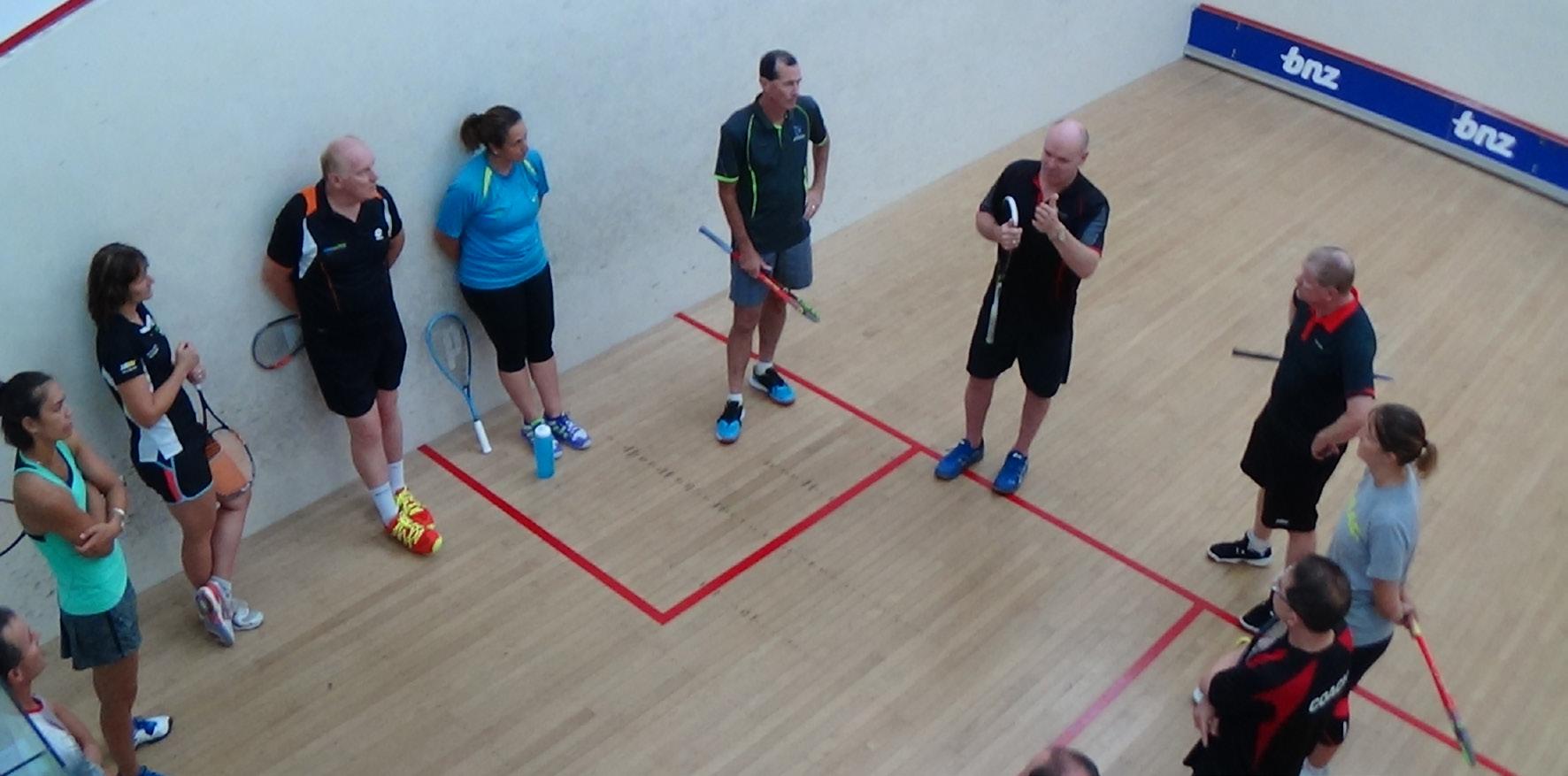
Mike Allred’s contributions as a mentor have been invaluable to the development of coaches in the South Island. His dedication to supporting and guiding them through their coaching journeys has led to increased confidence and growth among his mentees. Extending the mentoring programme’s duration could further enhance its impact, providing coaches with the long-term support they need to succeed.
To truly improve in squash, regular practice matches are essential. An old advice is to play practice matches against different levels of players. This advice is still valid today. What a lot of players fail to consider is that playing against a variety of opponents can significantly enhance your skills and game strategy.
Ideally, you should be looking to get an equal proportion of games against three categories of players:
• Players a little weaker than you
• Players of an equal standard
• Players a little stronger than you
Your matches against these three different levels of opponents will allow you to focus on different aspects of your development as a player. Here’s how you can make the most of your practice matches to elevate your game.
The aim is to play against weaker, equal, and stronger players for the following reasons:
• Weaker Players: Use these matches to practise new techniques and shots you’ve been working on in training. You’ll have more time to execute these under less pressure. This is the perfect opportunity to experiment with new strategies and refine your skills with low consequences.
• Equal Players: These matches help you stay sharp and competitive. Focus on playing good squash and maintaining a development mindset. Matches against players of a similar standard are crucial for maintaining your form and testing your consistency.
• Stronger Players: Find players who you feel are just the next level above you (but be realistic, you don’t want to stretch yourself too far). These matches are a benchmark for your progress. Track your improvements by noting how many points you win and how long you can keep them on the court. Playing against stronger opponents challenges you to push your limits and adapt to higher levels of play.
After each match, take time to reflect on your performance. Discuss with your practice partner or coach about what went well and what needs improvement. Watching video recordings can also provide valuable insights into your game. This reflection process is crucial for identifying patterns in your play and making necessary adjustments.
Even if you can’t get the broad variety of opponents, use your practice matches (remember the word practice!) to try and focus on different aspects of your development, stay competitive, and track your progress effectively, as opposed to seeing it as “win at all costs.” Regular practice matches are a key component of becoming a better squash player. Remember to enjoy the process and keep pushing your limits. Happy playing!
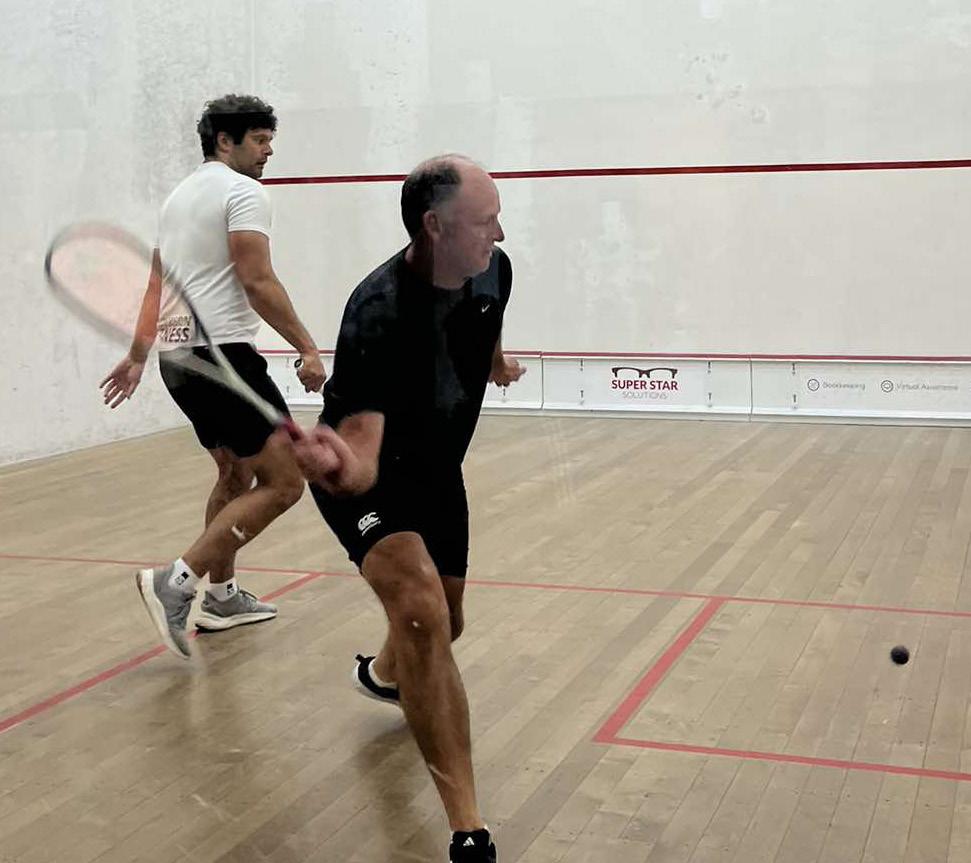
From our early online coaching courses, we delve into the concept of Athlete-Centred Coaching. This approach is all about empowering athletes to make their own choices, fostering higher levels of motivation, and guiding them to develop solutions that enhance their performance.
The core philosophy of Athlete-Centred Coaching is to understand and coach according to each participant’s unique motivation, ambition, and capability. By focusing on these individual aspects, coaches can create a more engaging and effective training environment.
What does Athlete-Centred Coaching look like in practice? See image
This method not only enhances performance but also helps athletes develop valuable life skills that extend beyond their sport.

To explore more of our online learning content, head to www.squashsmart.co.nz or to find out more on athlete centred coaching check out this blog from Balance is Better https://balanceisbetter.org.nz/the-number-one-thing-that-good-coaches-do/


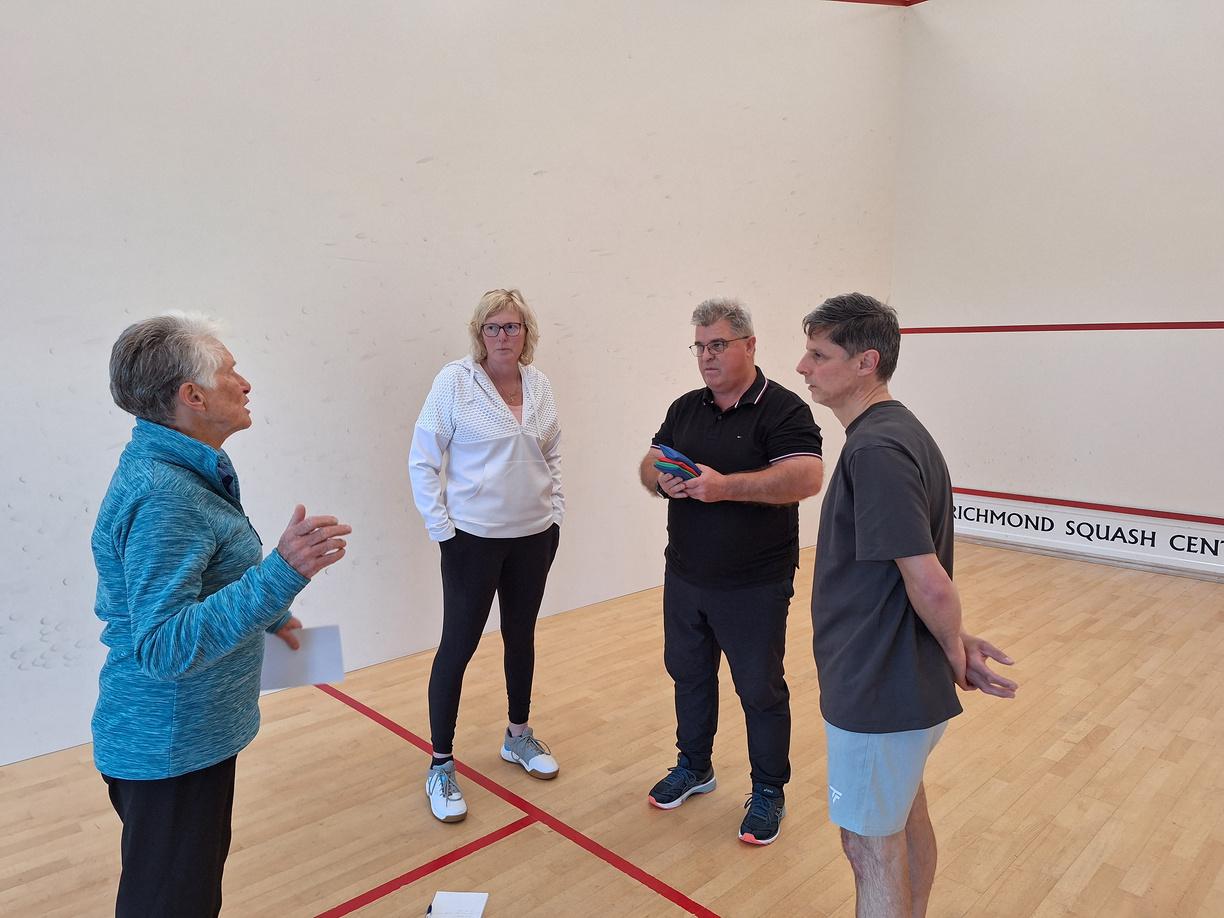




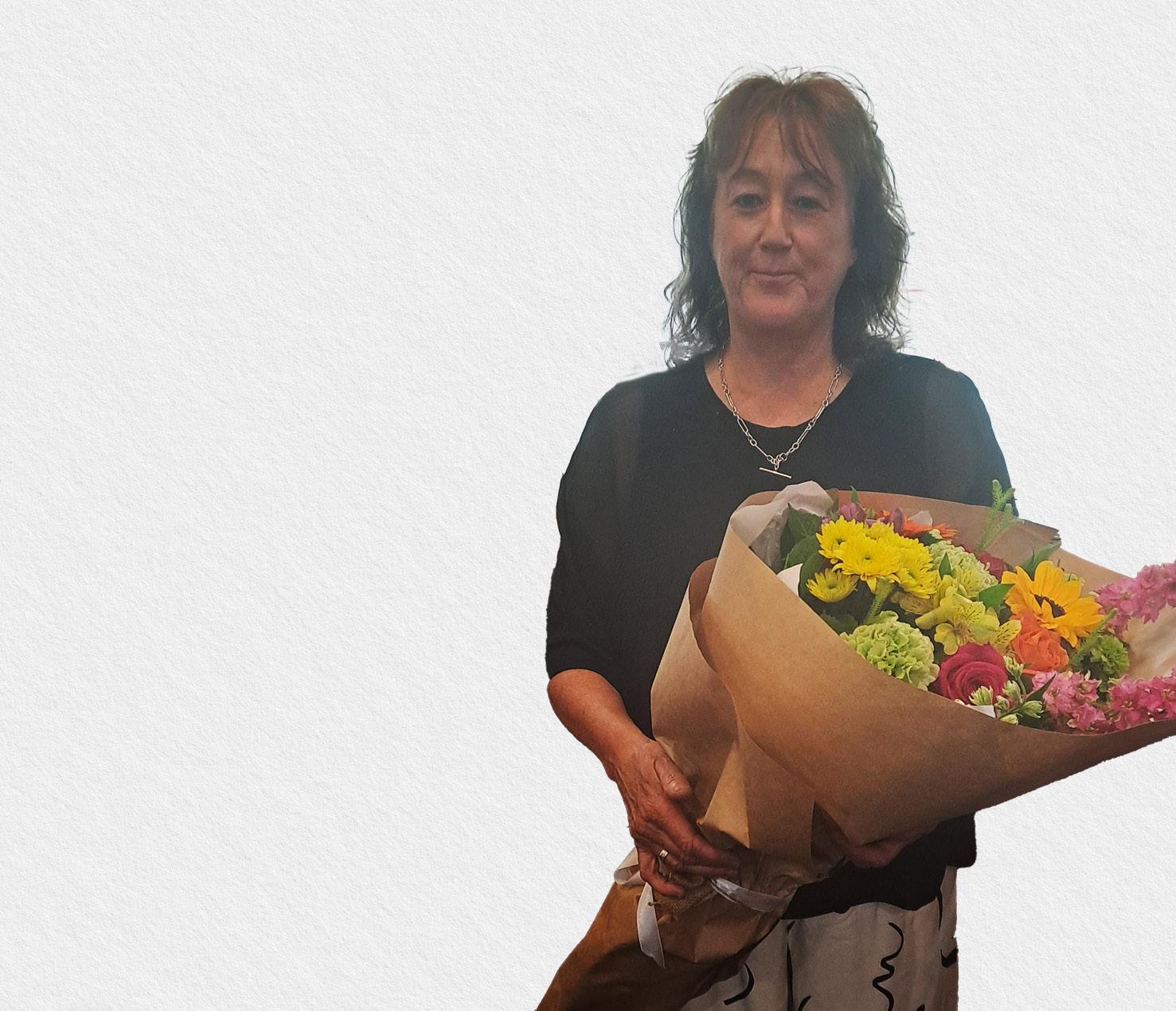
As Karen steps down from her President’s role this month at our AGM, Squash Northland would like to acknowledge Karen’s remarkable service as a Squash Northland volunteer. Her dedication over decades, and especially her 25 years on the Squash Northland Committee, is truly inspiring.
Her leadership as President for 10 years, as Treasurer for numerous years, and often in both roles simultaneously, demonstrates an exceptional commitment. Countless hours of volunteer work, always carried out with a smile and no fuss, have been invaluable to squash in Northland. From meetings and accounts to events, conferences, and workshops, Karen’s contributions are immeasurable.
Karen’s leadership style, both relaxed and efficient, she has fostered a welcoming environment for new committee members and her genuine interest in all our Northland Clubs and support for our players have made a lasting impact.
We are so thankful for Karen’s leadership and guidance through many changes over the years. Her behindthe-scenes efforts during the pandemic, the Kerikeri Squash Club rebuild, and significant changes at Squash NZ have been an essential part of Squash Northland’s growth and development over the years.
Karen’s involvement as Treasurer of the Whangarei Squash Club, your contributions to junior programs, running events and her Life Membership there further highlight her dedication. She established and coowned the Northland Racket Shop at Whangarei Squash Club for over 10 years, with Peter Gearing, selling and restringing rackets, sponsoring tournaments and up and coming junior players - all of which was such an asset to our squash community.
Squash has been a family affair for the Dykzeuls, and Karen’s passion for the game at all levels shines through. Having played competitive squash herself until injury prevented her from playing, Karen has nurtured a love for squash in her family. Along with her husband John, she spent many years taking her children, Sam and Zoe, to tournaments all over Northland, New Zealand and overseas in their junior squash days. We are grateful for her family’s involvement and John’s contributions to the Whangarei Squash Club.
Karen, you will be sorely missed but we know you’ll always be around for advice and a catch up over a gin or wine. Thank you.

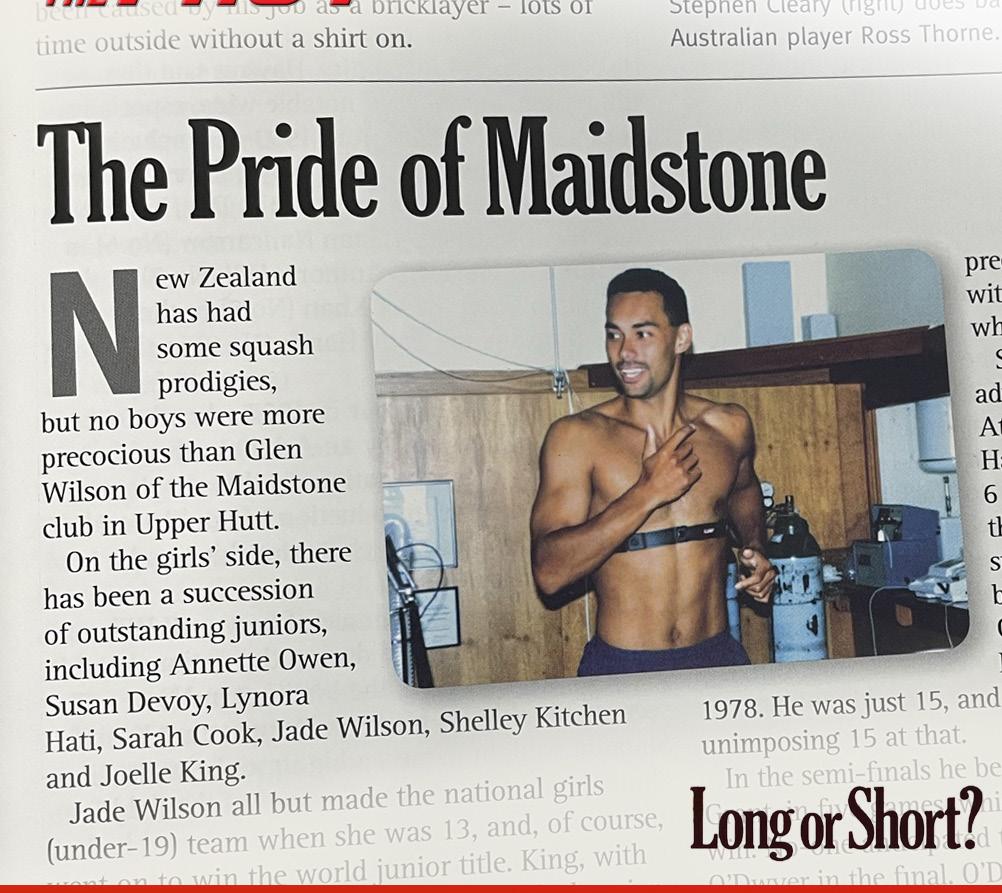
New Zealand has had some squash prodigies, but no boys were more precocious than Glen Wilson of the Maidstone club in Upper Hutt. At only 13, Wilson had blitzed the local B grade ranks in 1984 and was starting to beat A grade player. He was an A grader at 14. While only 15, Wilson was the New Zealand No 1 at the world junior men’s championship in Brisbane. Wilson was a touring professional while still in his teens and went on to earn a world ranking as high as 24. Wilson represented NZ in three successive Commonwealth Games – 1998, 2002, 2006. In 1998 he teamed up with Sarah Cook to win the mixed doubles bronze. Four years later Wilson and Leilani Rorani won the mixed doubles gold medal. Wilson holds a record for longevity. He first represented NZ in 1984 (playing as a junior) and finished with the 2006 Commonwealth games. No one has matched that 22-year span of representation at junior/senior level (excluding master’s squash).
Source: Long or Short? the Story of New Zealand Squash, written by Joseph Romanos

Now, we’re excited to introduce MySquash Competitions—your new and improved platform for managing squash tournaments, interclub matches, and club competitions.
To access MySquash Competitions, simply log in to your MySquash accountand click the ‘Competitions’ button in the menu.
As with any major upgrade, there may be a few small issues as we fine-tune everything. We appreciate your patience and are actively working to improve functionality while rolling out exciting new features over the coming days (Ladders), weeks (Box Leagues, additional casual competitions plus tournament enhancements), and months (Doubles & Racketball).
What’s New?
• Modern, Mobile-Friendly Design – A fresh, intuitive interface.
• Club Competitions – Easily join club ladders, box leagues, and mini-tournaments.
• Create Your Own Games – Organize competitions with friends.
• Live Scoring – Score your matches directly from your phone.
• SquashLevel for All Players – Track your progress and find well-matched opponents.
• Seamless Club Integration – If your club uses Hello Club, you can link profiles for a smoother experience.
There are four types of player subscriptions, set by your club:
Competitive – For graded players who compete in tournaments or interclub.
Lifestyle – Ideal for social players who enjoy casual games, club nights, or internal competitions.
Junior - Same access as Competitive,but for all our junior players.
Digital - Non-players who want to stay informed.
To check your subscription type, log in to MySquash, go to Profile, and look under ‘Membership’.
If you don’t see an active MySquash membership, it may be because:
1. Your club is still updating player subscriptions (this should be completed soon).
2. Your club membership isn’t current.
3. A duplicate profile was created due to mismatched information—this will be resolved shortly.
If your club can’t assist, please email support@squashnz.co.nz
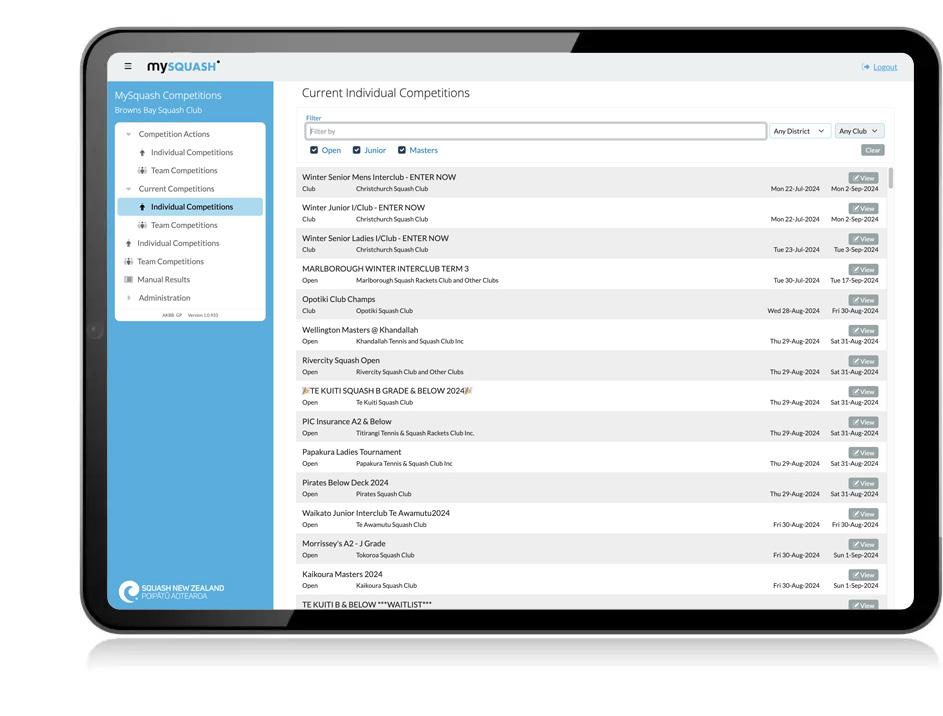
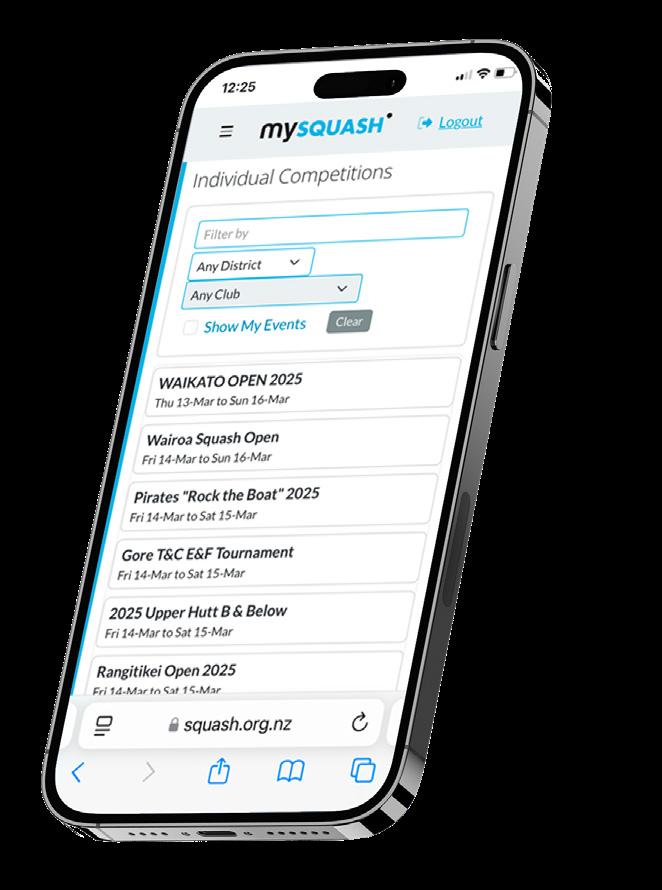
When you enter MySquash Competitions, the home screen is where you can enter tournaments. If you cannot see any tournaments, your subscription is not set up correctly yet (see above).
Click HERE to view a list of contact details for clubs hosting tournaments over the next two weekends, so you can ask them to register you via email while your access is sorted.
To help you get started, we’ve created a set of short video guides covering:
• Registering for a tournament
• Viewing draws and results
• Using live scoring
Already have a MySquash account? Simply log in and click ‘Competitions’—no separate iSquash login needed!
New to MySquash? Once your club has completed setup, you’ll receive a welcome email with an activation link. Follow the steps, and you’re all set.
For Club Members – MySquash access is included in your club membership.
For Non-Club Members – You can purchase a Lifestyle or Junior Player subscription directly. Competitive subscriptions are only available through clubs.
If your club uses Hello Club: Use the same email for both accounts. Once linked, easily switch between profiles using the ‘Profile Switcher’in the top right corner.

From our research into the overwhelmed case where the better players simply overpower their lower level opponents and gain level increases that they shouldn’t really have, we have found that this is a very common occurrence with the top pros - both the men and the women.
As a result, we realise that the very high levels that the top pros have acheived are not as accurate as we would like and so, whereas we have applied the overwhelmed case limits to ‘normal’ players from the end of 2024, we have decided to apply these limits to all historic pro matches as well.
You will notice an immediate level drop of the top players with the top men dropping from well over 100,000 to a little under that and the same for the top women players dropping back under 20,000. These new levels have been assessed by former professional players and we believe they are more representative now and therefore more comparative with the top players from previous eras.
Although it is the top pros that are affected most, all the professional level players will be affected to some extent; just more so at the top than lower down. Any male player over 20,000 may notice their level has dropped at least by some amount, female players from about 4,000 and up. Although the absolute numbers will be lower, the general ranking order should remain pretty much unchanged.
Those top players who don’t normally destroy their lower level opponents will probably fair better and not drop so much!
Answers to squash trivia (from p 29)
A1: 1913 (Wellington)
A2: Two
A3: Qatar
We’re excited for you to experience MySquash Competitions and all its new features. If you have any questions, don’t hesitate to reach out.
A4: Tarek Momen, 36 and ranked 7
A5: 130 mins (Gohar v Hammamy 2023).
A6:Joelle King, Ella Lash, Anthony Lepper, Oliver Dunbar
A7: Hutt City Squash Club (Wellington)
A8: Saturday 8th March, Isaac Theatre Royal, Christchurch.
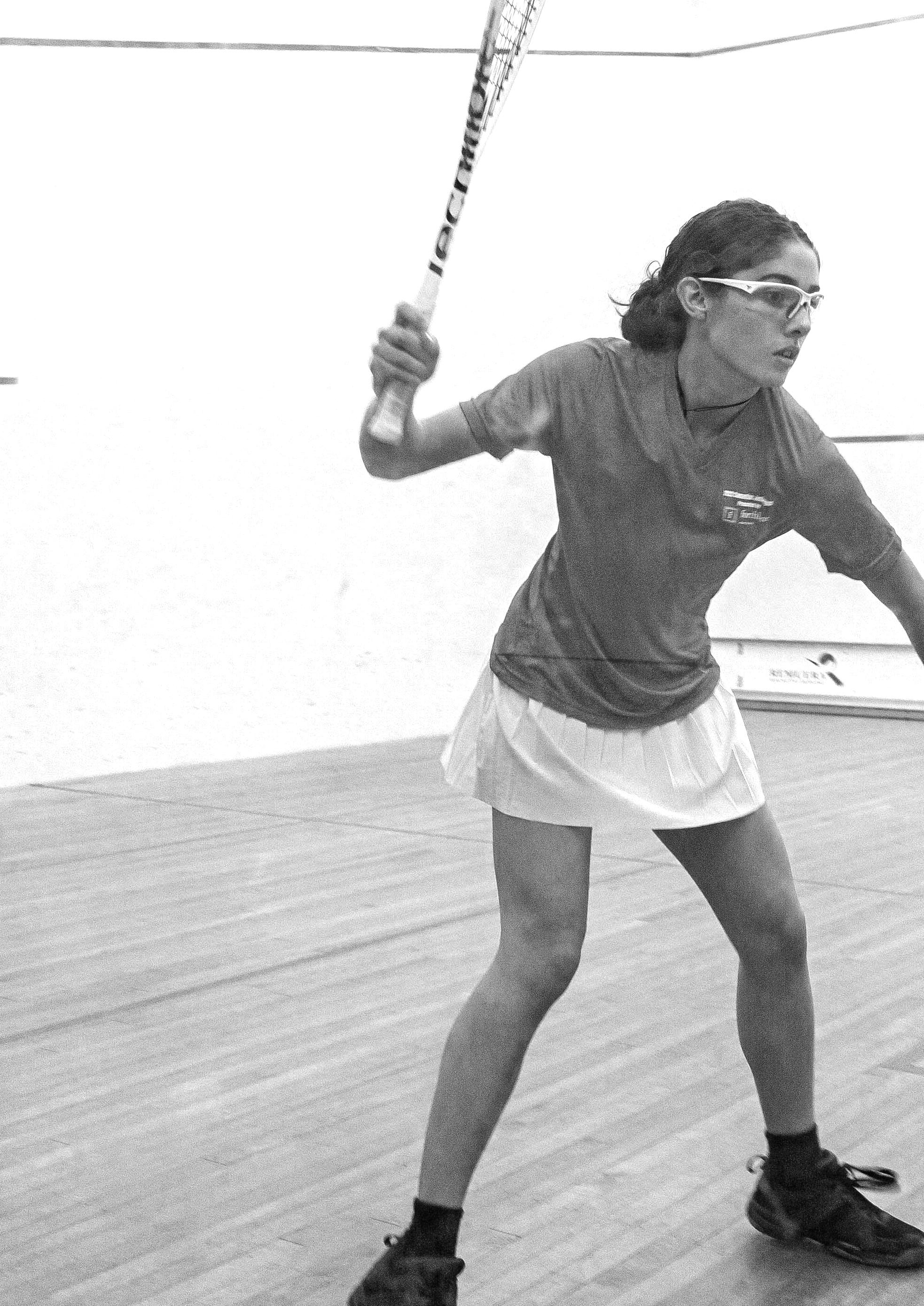
MOST IMPROVED FEMALE
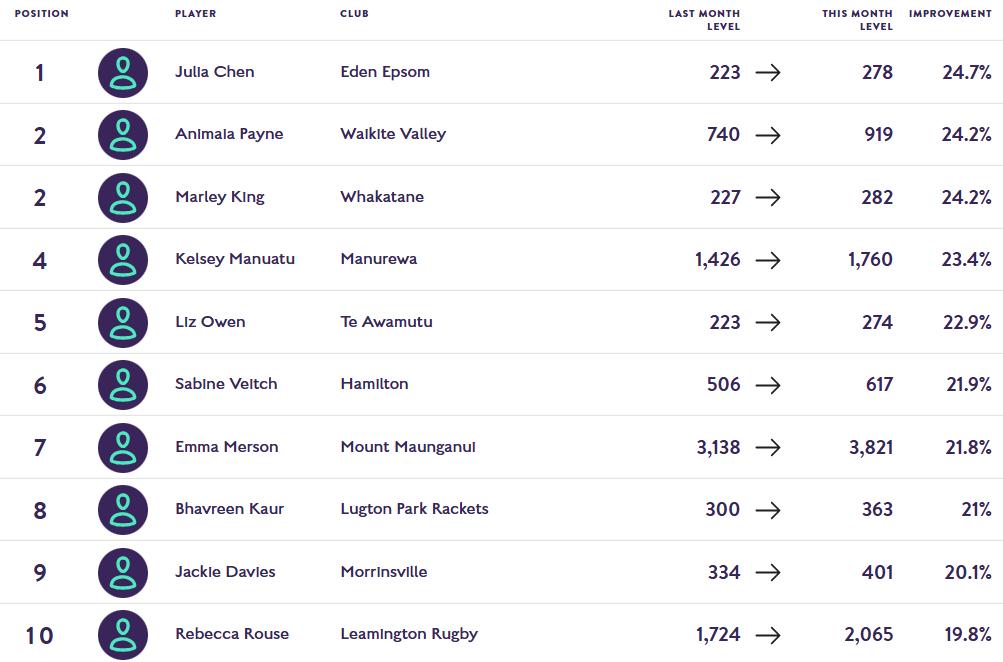
JULIA CHEN / Eden Epsom
MOST IMPROVED MALE congratulations congratulations 24.7%

SUMEIR BAINS / Te Rapa
48.3%

Sign up via MySquash Competitions or email Tyler@squashnz.co.nz (International)
Entries close 28 March
Participating countries
Australia, Cook Islands, Fiji, New Caledonia, New Zealand, Norfolk Island, Papua New Guinea, Samoa, Tahiti, Vanuatu
Individuals’ 19–21 April 2025
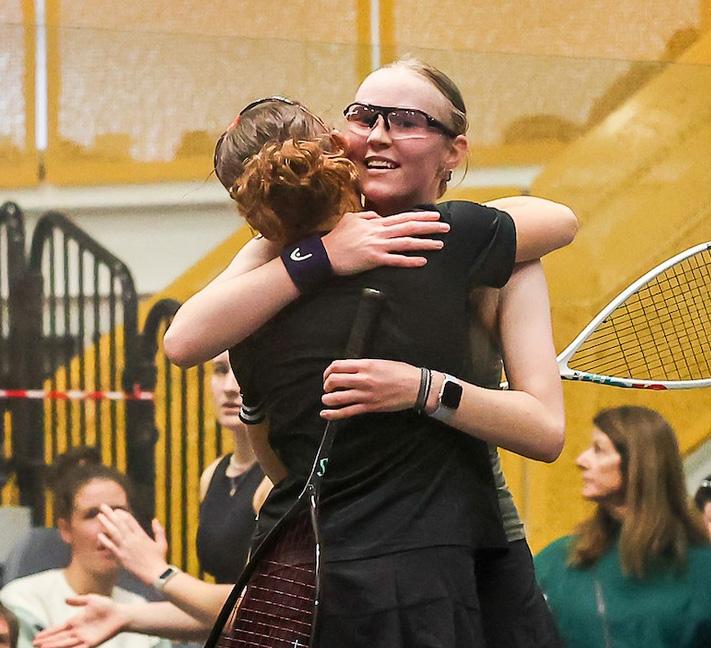



Trans-Tasman (Australia vs New Zealand) 22–23 April 2025
Event
New Zealand Junior Open
Canterbury Junior Open
Oceania Junior Championships
Central Junior Open
Auckland Junior Open
Waikato Junior Open
North Island Junior Championships
South Island Junior Age Groups
Wellington Junior Open
Northland Junior Open
BOP Junior Open
NZ Secondary Schools Squash Nationals
Eastern Junior Age Groups
Otago Junior Open
Southland Junior Open
Midlands Junior Open
G.J. Gardner Homes NZ Junior Age Group Championships
NZ Inter-Disrtict Junior Team Championships
Date
7th - 9th March
4th - 6th April
19th - 21st April
23rd - 25th May
6th - 8th June
12th - 14th June
28th - 30th June
11th - 12th July
17th - 19th July
25th - 27th July
25th - 27th July
1st - 3rd August
22nd - 24th August
22nd - 24th August
29th - 31st August
5th - 6th September
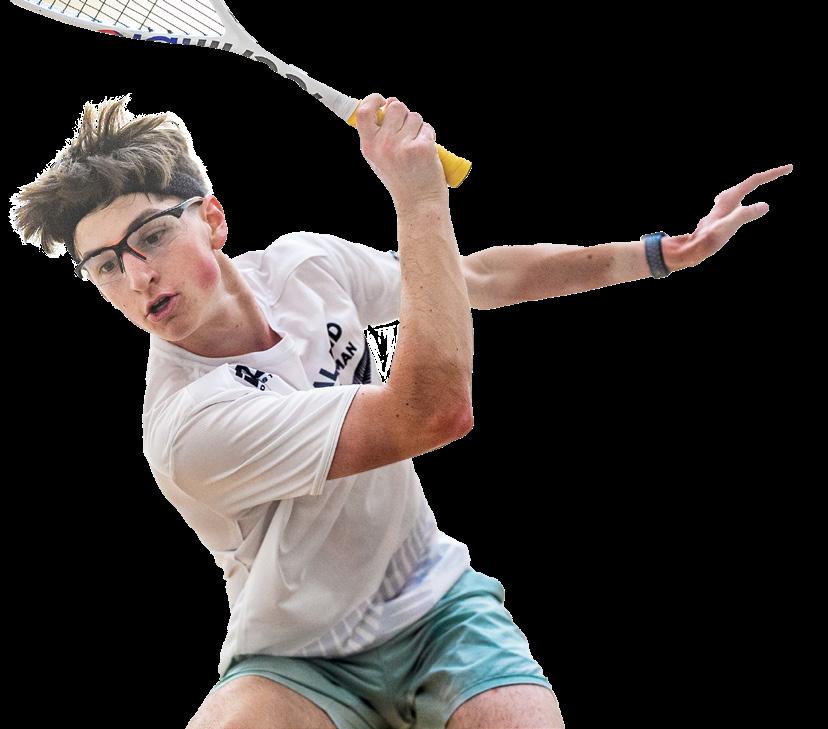
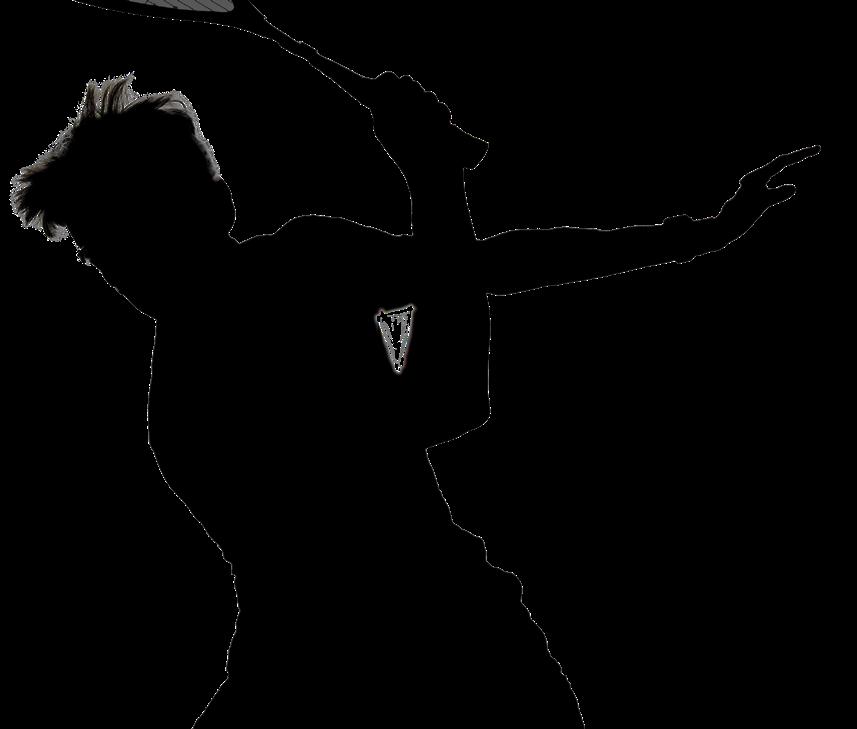

Venue
Christchurch Squash Club
Rangiora Squash Club
Hamilton Tennis & Squash Club
Ohakune Squash Club
Remuera Rackets Club
Morrinsville Squash Club
Whangarei Squash Club
Ashburton Squash Club
Tawa Squash Club
Keri Keri Squash Club
Whakatane Squash Club
Hutt City Squash Club
Hawkes Bay Squash Rackets Club
Cromwell Squash Club
SquashCity Invercargill
Timaru Squash Club
26th - 28th September
29th - 30th September
Henderson Squash Club
Henderson Squash Club



New Zealand Masters Games
Auckland Masters
Central Masters
Canterbury Masters
Waikato Masters
Midlands Masters
Wellington Masters
Otago Masters
Masters Club Team Championships
Northland Masters
BOP Masters
Southland Masters
G.J. Gardner Homes NZ Masters Championships
NZ Inter-Disrict Masters Team Championships
6h - 9th February
20th - 22nd March
11th - 12th April
16th - 18th May
22nd - 24th May
11th - 12th July
17th - 19th July
8th - 9th August
8th - 10th August
22nd - 24th August
29th - 31st August
29th - 31st August
17th - 19th October
20th - 21st October
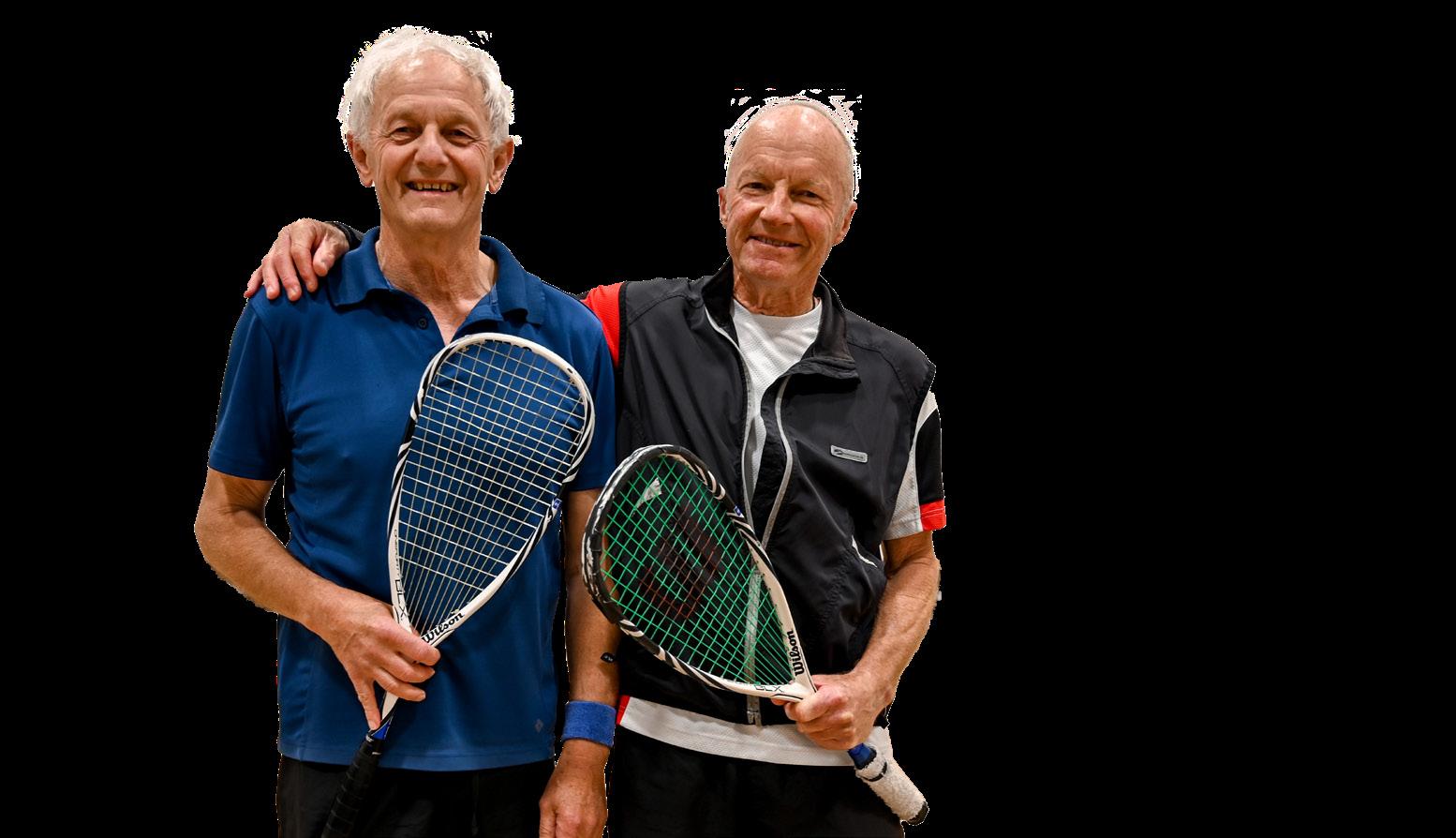
Whanganui Squash Club
Kumeu Squash Club
Okato Squash Club
Christchurch Football Club
Huntly Squash Club
Ashburton Celtic Squash Club
Tawa Squash Club
Pirates Squash Club
Hutt City Squash Club
Kamo Squash Club
Te Puke Squash Club
SquashCity Invercargill
Nelson Squash Club
Nelson Squash Club
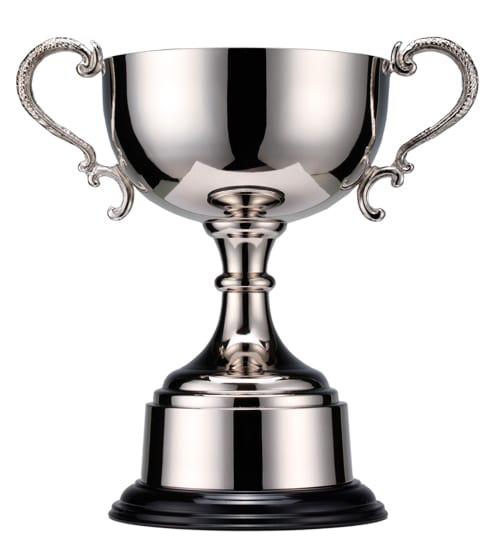

Event
Waikato Open
Eastern Open
BOP Open
Auckland Open (PSA)
Southland Open
Otago Open
Northland Open
Wellington Open
Central Open
South Island & Canterbury Open
Midlands Open (PSA)
Date
14th - 16th March
2nd - 4th May
9th - 11th May
22nd - 25th May
23rd - 25th May
6th - 7th June
6th - 8th June
6th - 8th June
13th - 15th June
19th - 22nd June
28th - 31st June
Hamilton Squash & Tennis Club
Hastings Squash Club
Taupo Squash Club
North Shore Squash Club
SquashCity Invercargill & ILT Stadium Southland
Otago Squash Club
Whangarei Squash Club
Club Kelburn
SquashGym Palmerston North
Christchurch Football Club & Richmond Squash Club
Temuka Squash Club
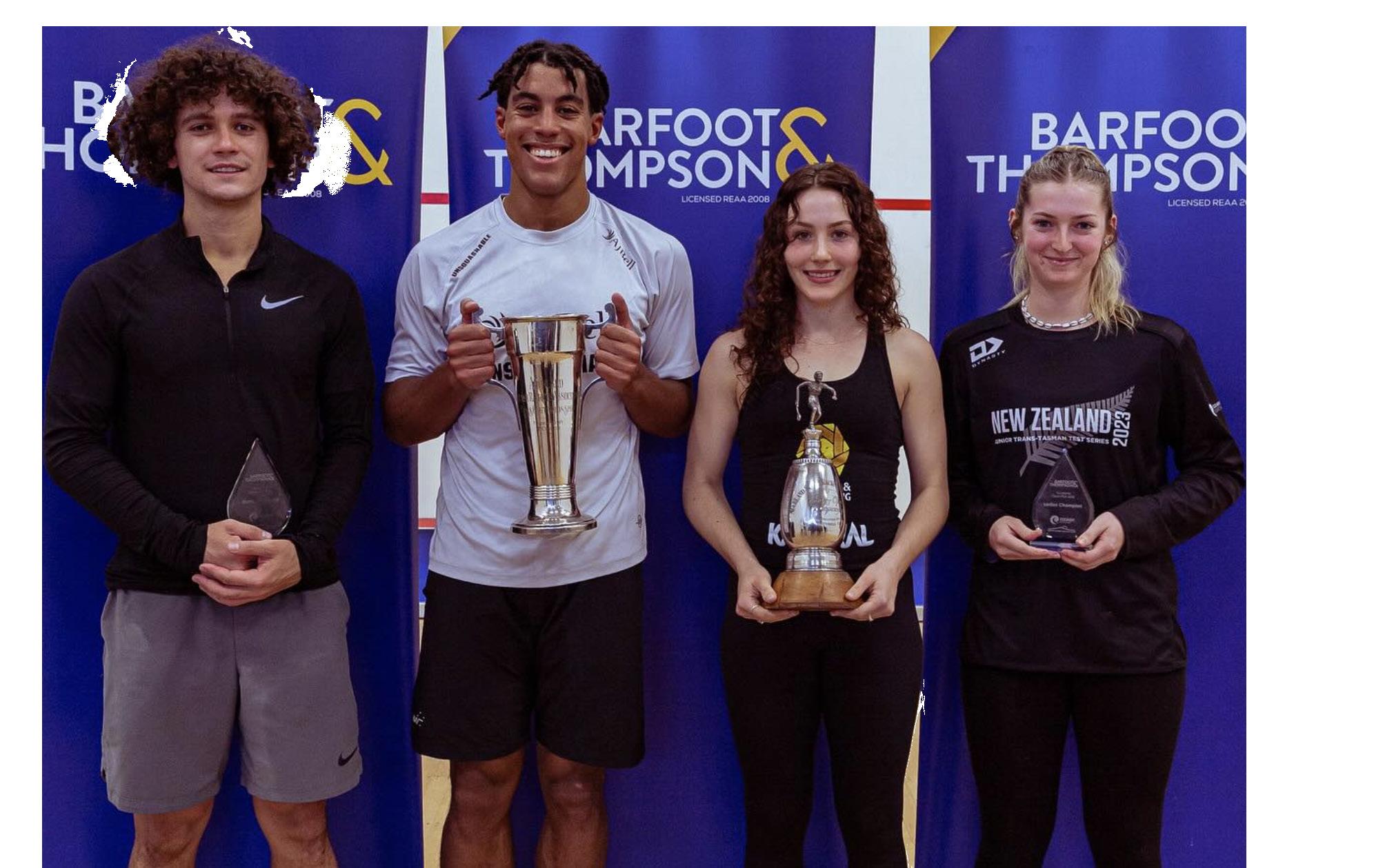

4th - 9th
7th - 9th
28th - 29th
19th - 21st
30th - 1st
28th - 30th
4th - 6th
11th - 12th
1st - 3rd
8th - 10th
15th - 16th
10th - 14th
10th - 14th
10th - 14th
10th - 14th
10th - 14th
26th - 28th
29th - 30th
17th - 19th
20th - 21st
New Zealand Open
New Zealand Junior Open
New Zealand Doubles Championships
Oceania Junior Championships
Mitchell Cup & Cousins Shield
North Island Junior Championships
New Zealand Championships + National Graded Champs
South Island Junior Age Groups
NZ Secondary Schools Squash Nationals
Masters Club Team Championships
NZ Inter-District Team Championships
G.J. Gardner Homes National Superchamps
B Grade Superchamps
C Grade Superchamps
D Grade Superchamps
E Grade Superchamps
F/J Grade Superchamps
G.J. Gardner Homes NZ Junior Age Group Championships
NZ Inter-District Junior Team Championships
G.J. Gardner Homes NZ Masters Championships
NZ Inter-District Masters Team Championships

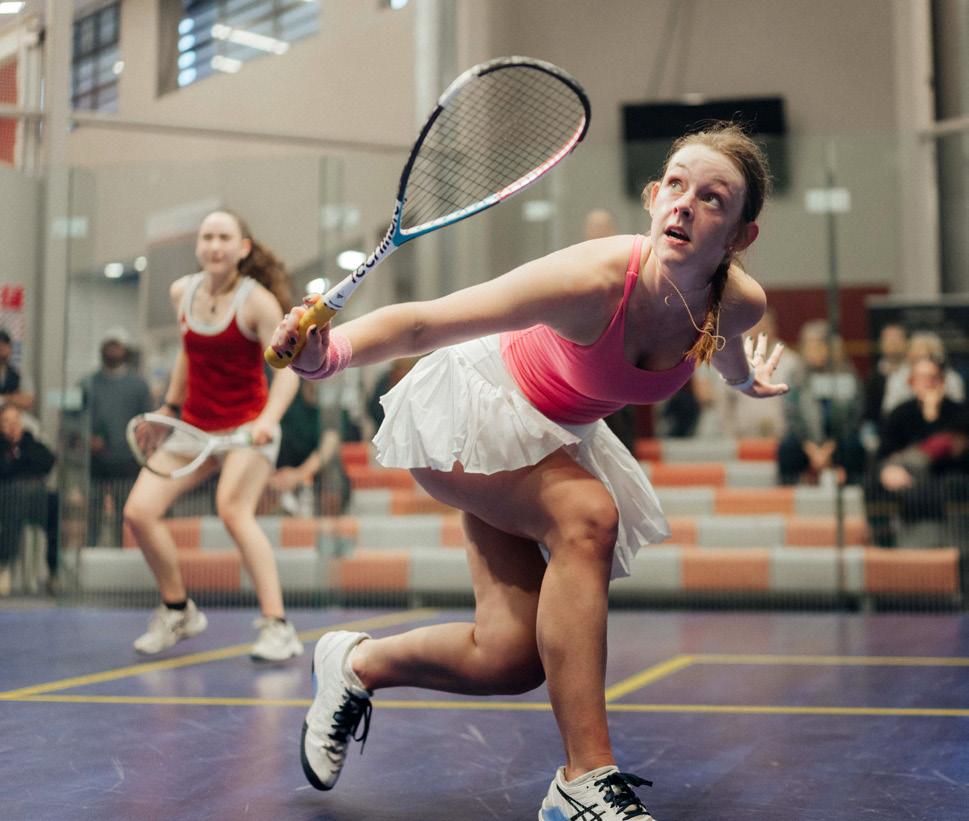
Isaac
Christchurch Squash Club
Hutt City Squash Club
Hamilton Tennis & Squash Club
Cambridge Rackets Club
Whangarei Squash Club
North Shore Squash Club
Ashburton Squash Club
Hutt City Squash Club
Hutt City Squash Club
Squash Gym Palmerston North
Timaru Squash Club
Otago Squash Club
SquashCity Invercargill
Hawkes Bay Squash Rackets Club
Geyser City Squash Club
Henderson Squash Club
Henderson Squash Club
Nelson Squash Club
Nelson Squash Club

Want to be featured in The Boast?
Email admin@squashnz.co.nz with stories from your club or district to be featured in the next edition of The Boast.
MAJOR PARTNERS

STRATEGIC FUNDERS
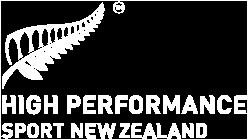
MAJOR FUNDERS
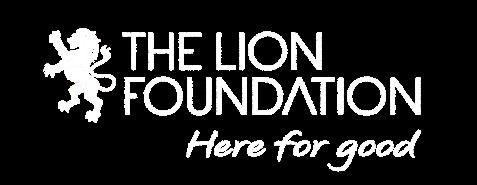
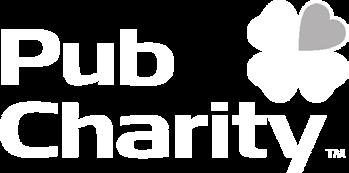

SUPPORTING PARTNERS

Subscribe to The Boast here